Leadership and Management for Service Industries
VerifiedAdded on 2023/01/19
|16
|5488
|33
AI Summary
This report focuses on the importance of leadership and management in the hospitality industry, specifically in Hilton Hotels. It covers classical management theories, roles of leaders and leadership styles, management and leadership styles in Hilton Hotels, current management and leadership style of the organization, internal and external factors influencing management styles, and more.
Contribute Materials
Your contribution can guide someone’s learning journey. Share your
documents today.
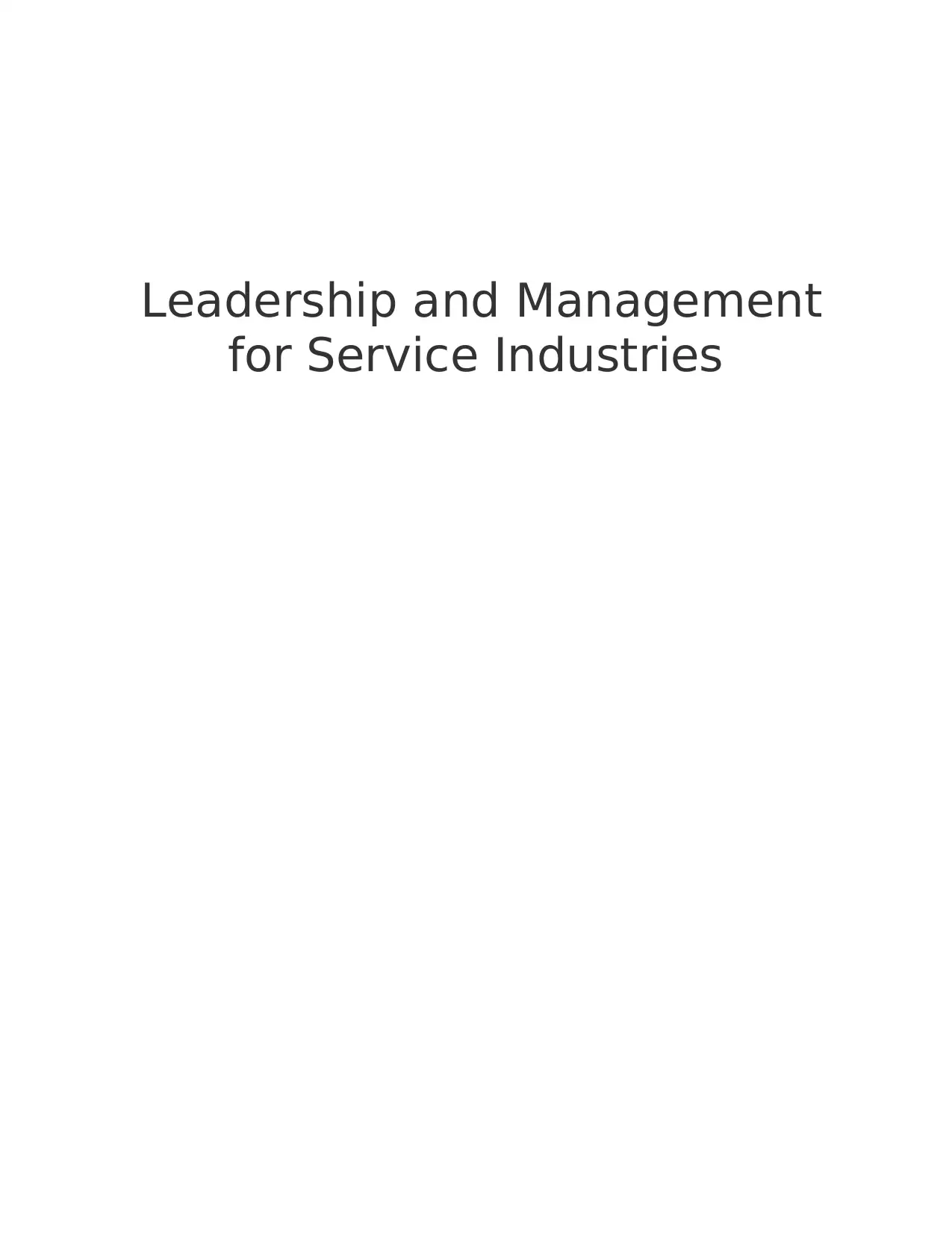
Leadership and Management
for Service Industries
for Service Industries
Secure Best Marks with AI Grader
Need help grading? Try our AI Grader for instant feedback on your assignments.
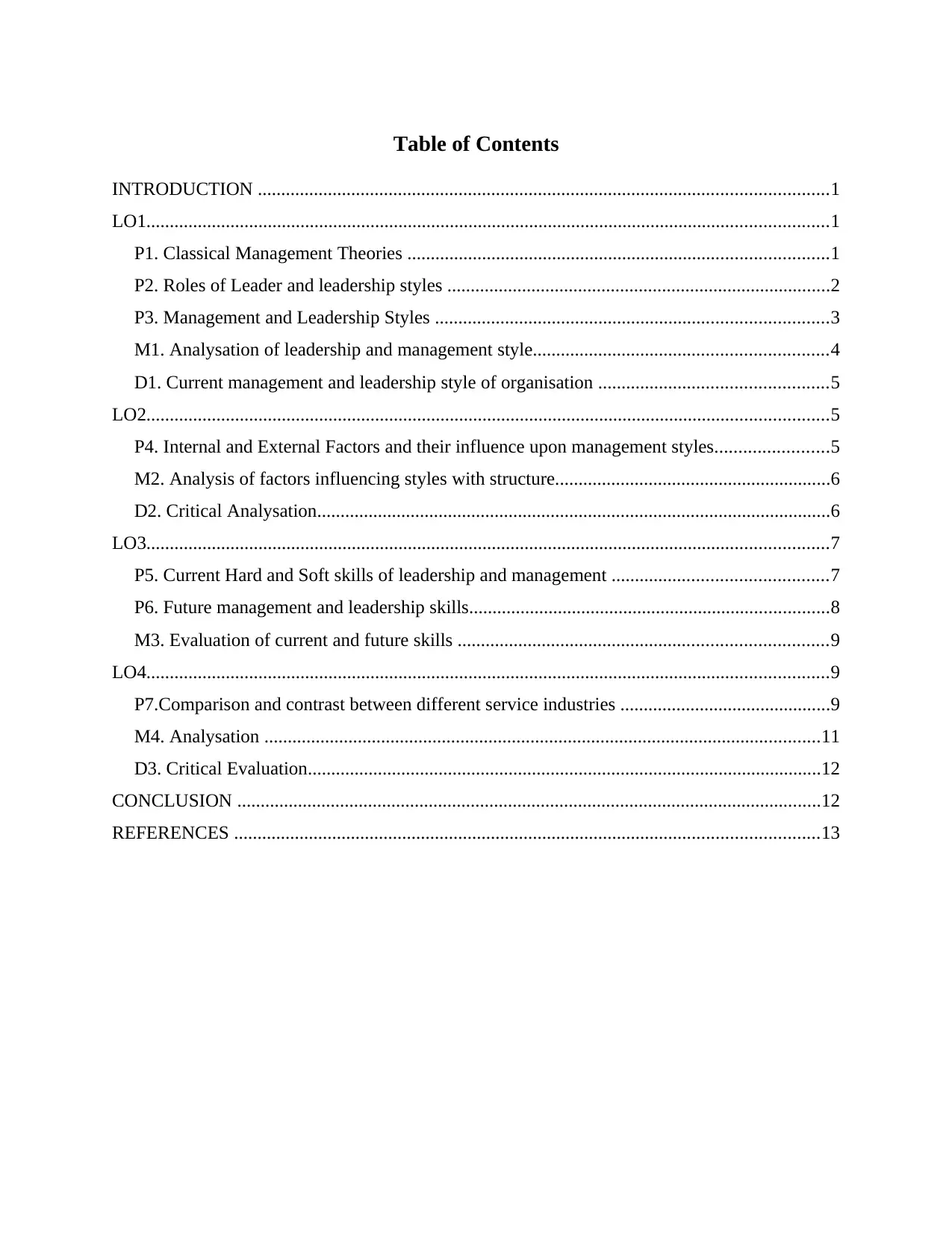
Table of Contents
INTRODUCTION ..........................................................................................................................1
LO1..................................................................................................................................................1
P1. Classical Management Theories ..........................................................................................1
P2. Roles of Leader and leadership styles ..................................................................................2
P3. Management and Leadership Styles ....................................................................................3
M1. Analysation of leadership and management style...............................................................4
D1. Current management and leadership style of organisation .................................................5
LO2..................................................................................................................................................5
P4. Internal and External Factors and their influence upon management styles........................5
M2. Analysis of factors influencing styles with structure...........................................................6
D2. Critical Analysation..............................................................................................................6
LO3..................................................................................................................................................7
P5. Current Hard and Soft skills of leadership and management ..............................................7
P6. Future management and leadership skills.............................................................................8
M3. Evaluation of current and future skills ...............................................................................9
LO4..................................................................................................................................................9
P7.Comparison and contrast between different service industries .............................................9
M4. Analysation .......................................................................................................................11
D3. Critical Evaluation..............................................................................................................12
CONCLUSION .............................................................................................................................12
REFERENCES .............................................................................................................................13
INTRODUCTION ..........................................................................................................................1
LO1..................................................................................................................................................1
P1. Classical Management Theories ..........................................................................................1
P2. Roles of Leader and leadership styles ..................................................................................2
P3. Management and Leadership Styles ....................................................................................3
M1. Analysation of leadership and management style...............................................................4
D1. Current management and leadership style of organisation .................................................5
LO2..................................................................................................................................................5
P4. Internal and External Factors and their influence upon management styles........................5
M2. Analysis of factors influencing styles with structure...........................................................6
D2. Critical Analysation..............................................................................................................6
LO3..................................................................................................................................................7
P5. Current Hard and Soft skills of leadership and management ..............................................7
P6. Future management and leadership skills.............................................................................8
M3. Evaluation of current and future skills ...............................................................................9
LO4..................................................................................................................................................9
P7.Comparison and contrast between different service industries .............................................9
M4. Analysation .......................................................................................................................11
D3. Critical Evaluation..............................................................................................................12
CONCLUSION .............................................................................................................................12
REFERENCES .............................................................................................................................13
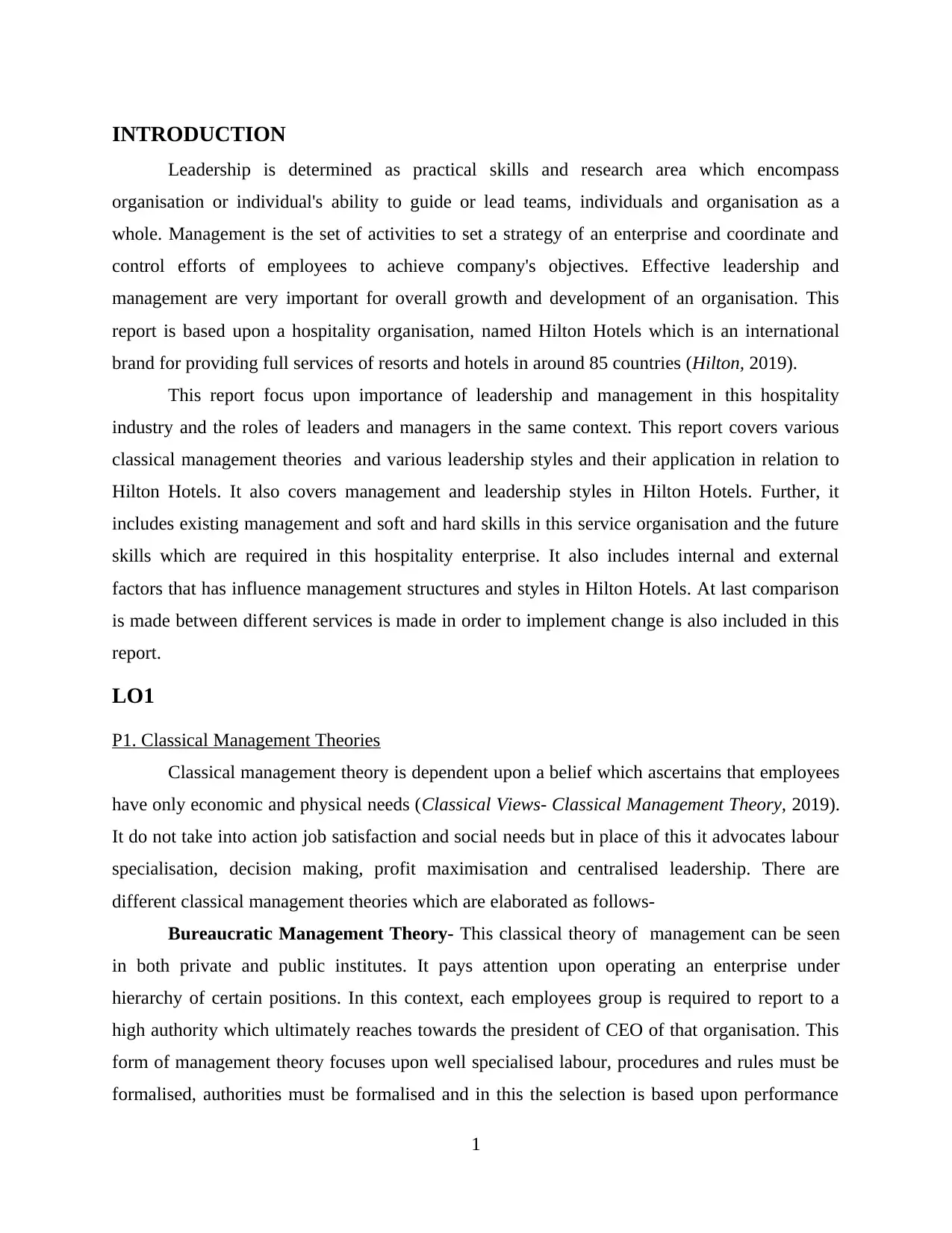
INTRODUCTION
Leadership is determined as practical skills and research area which encompass
organisation or individual's ability to guide or lead teams, individuals and organisation as a
whole. Management is the set of activities to set a strategy of an enterprise and coordinate and
control efforts of employees to achieve company's objectives. Effective leadership and
management are very important for overall growth and development of an organisation. This
report is based upon a hospitality organisation, named Hilton Hotels which is an international
brand for providing full services of resorts and hotels in around 85 countries (Hilton, 2019).
This report focus upon importance of leadership and management in this hospitality
industry and the roles of leaders and managers in the same context. This report covers various
classical management theories and various leadership styles and their application in relation to
Hilton Hotels. It also covers management and leadership styles in Hilton Hotels. Further, it
includes existing management and soft and hard skills in this service organisation and the future
skills which are required in this hospitality enterprise. It also includes internal and external
factors that has influence management structures and styles in Hilton Hotels. At last comparison
is made between different services is made in order to implement change is also included in this
report.
LO1
P1. Classical Management Theories
Classical management theory is dependent upon a belief which ascertains that employees
have only economic and physical needs (Classical Views- Classical Management Theory, 2019).
It do not take into action job satisfaction and social needs but in place of this it advocates labour
specialisation, decision making, profit maximisation and centralised leadership. There are
different classical management theories which are elaborated as follows-
Bureaucratic Management Theory- This classical theory of management can be seen
in both private and public institutes. It pays attention upon operating an enterprise under
hierarchy of certain positions. In this context, each employees group is required to report to a
high authority which ultimately reaches towards the president of CEO of that organisation. This
form of management theory focuses upon well specialised labour, procedures and rules must be
formalised, authorities must be formalised and in this the selection is based upon performance
1
Leadership is determined as practical skills and research area which encompass
organisation or individual's ability to guide or lead teams, individuals and organisation as a
whole. Management is the set of activities to set a strategy of an enterprise and coordinate and
control efforts of employees to achieve company's objectives. Effective leadership and
management are very important for overall growth and development of an organisation. This
report is based upon a hospitality organisation, named Hilton Hotels which is an international
brand for providing full services of resorts and hotels in around 85 countries (Hilton, 2019).
This report focus upon importance of leadership and management in this hospitality
industry and the roles of leaders and managers in the same context. This report covers various
classical management theories and various leadership styles and their application in relation to
Hilton Hotels. It also covers management and leadership styles in Hilton Hotels. Further, it
includes existing management and soft and hard skills in this service organisation and the future
skills which are required in this hospitality enterprise. It also includes internal and external
factors that has influence management structures and styles in Hilton Hotels. At last comparison
is made between different services is made in order to implement change is also included in this
report.
LO1
P1. Classical Management Theories
Classical management theory is dependent upon a belief which ascertains that employees
have only economic and physical needs (Classical Views- Classical Management Theory, 2019).
It do not take into action job satisfaction and social needs but in place of this it advocates labour
specialisation, decision making, profit maximisation and centralised leadership. There are
different classical management theories which are elaborated as follows-
Bureaucratic Management Theory- This classical theory of management can be seen
in both private and public institutes. It pays attention upon operating an enterprise under
hierarchy of certain positions. In this context, each employees group is required to report to a
high authority which ultimately reaches towards the president of CEO of that organisation. This
form of management theory focuses upon well specialised labour, procedures and rules must be
formalised, authorities must be formalised and in this the selection is based upon performance
1
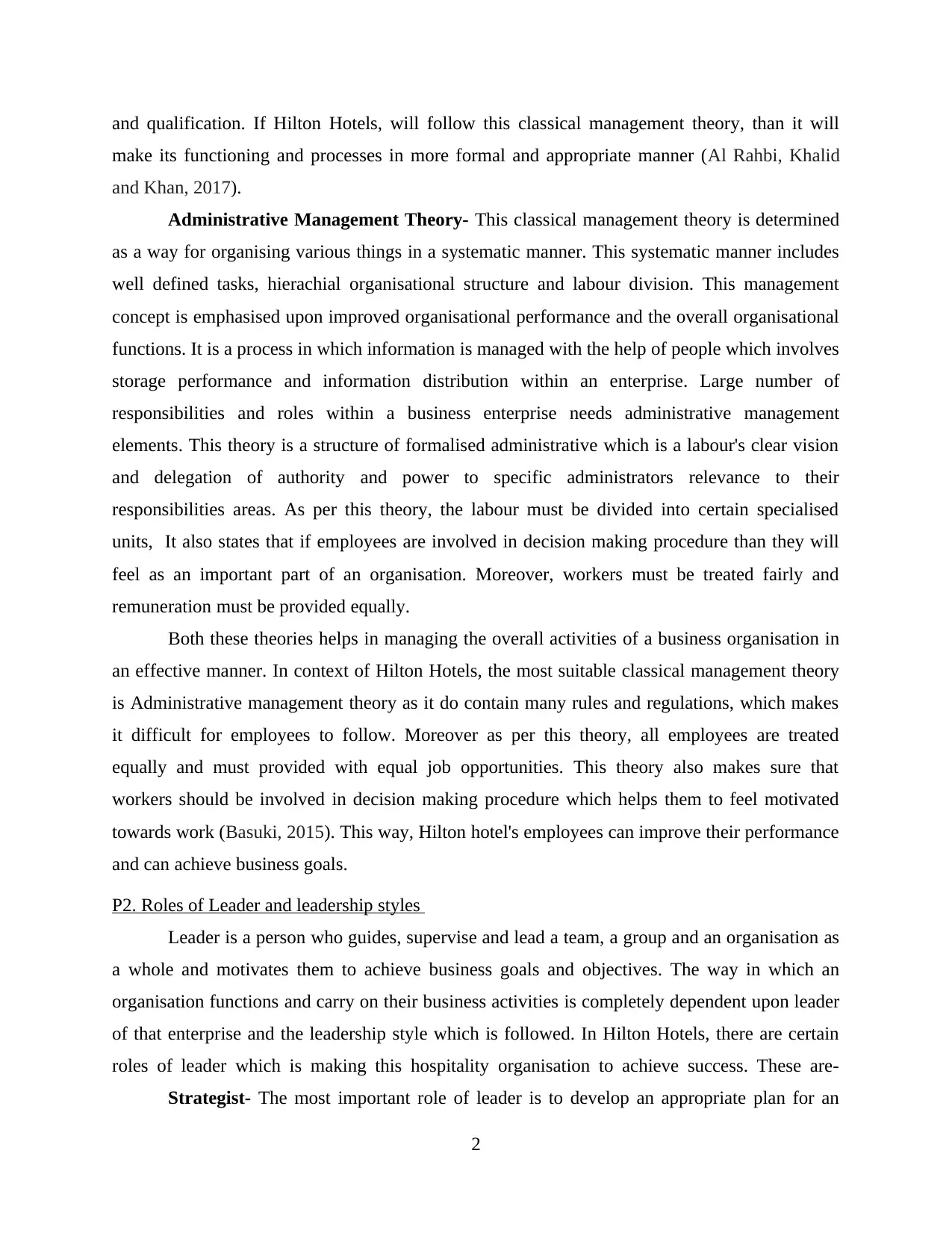
and qualification. If Hilton Hotels, will follow this classical management theory, than it will
make its functioning and processes in more formal and appropriate manner (Al Rahbi, Khalid
and Khan, 2017).
Administrative Management Theory- This classical management theory is determined
as a way for organising various things in a systematic manner. This systematic manner includes
well defined tasks, hierachial organisational structure and labour division. This management
concept is emphasised upon improved organisational performance and the overall organisational
functions. It is a process in which information is managed with the help of people which involves
storage performance and information distribution within an enterprise. Large number of
responsibilities and roles within a business enterprise needs administrative management
elements. This theory is a structure of formalised administrative which is a labour's clear vision
and delegation of authority and power to specific administrators relevance to their
responsibilities areas. As per this theory, the labour must be divided into certain specialised
units, It also states that if employees are involved in decision making procedure than they will
feel as an important part of an organisation. Moreover, workers must be treated fairly and
remuneration must be provided equally.
Both these theories helps in managing the overall activities of a business organisation in
an effective manner. In context of Hilton Hotels, the most suitable classical management theory
is Administrative management theory as it do contain many rules and regulations, which makes
it difficult for employees to follow. Moreover as per this theory, all employees are treated
equally and must provided with equal job opportunities. This theory also makes sure that
workers should be involved in decision making procedure which helps them to feel motivated
towards work (Basuki, 2015). This way, Hilton hotel's employees can improve their performance
and can achieve business goals.
P2. Roles of Leader and leadership styles
Leader is a person who guides, supervise and lead a team, a group and an organisation as
a whole and motivates them to achieve business goals and objectives. The way in which an
organisation functions and carry on their business activities is completely dependent upon leader
of that enterprise and the leadership style which is followed. In Hilton Hotels, there are certain
roles of leader which is making this hospitality organisation to achieve success. These are-
Strategist- The most important role of leader is to develop an appropriate plan for an
2
make its functioning and processes in more formal and appropriate manner (Al Rahbi, Khalid
and Khan, 2017).
Administrative Management Theory- This classical management theory is determined
as a way for organising various things in a systematic manner. This systematic manner includes
well defined tasks, hierachial organisational structure and labour division. This management
concept is emphasised upon improved organisational performance and the overall organisational
functions. It is a process in which information is managed with the help of people which involves
storage performance and information distribution within an enterprise. Large number of
responsibilities and roles within a business enterprise needs administrative management
elements. This theory is a structure of formalised administrative which is a labour's clear vision
and delegation of authority and power to specific administrators relevance to their
responsibilities areas. As per this theory, the labour must be divided into certain specialised
units, It also states that if employees are involved in decision making procedure than they will
feel as an important part of an organisation. Moreover, workers must be treated fairly and
remuneration must be provided equally.
Both these theories helps in managing the overall activities of a business organisation in
an effective manner. In context of Hilton Hotels, the most suitable classical management theory
is Administrative management theory as it do contain many rules and regulations, which makes
it difficult for employees to follow. Moreover as per this theory, all employees are treated
equally and must provided with equal job opportunities. This theory also makes sure that
workers should be involved in decision making procedure which helps them to feel motivated
towards work (Basuki, 2015). This way, Hilton hotel's employees can improve their performance
and can achieve business goals.
P2. Roles of Leader and leadership styles
Leader is a person who guides, supervise and lead a team, a group and an organisation as
a whole and motivates them to achieve business goals and objectives. The way in which an
organisation functions and carry on their business activities is completely dependent upon leader
of that enterprise and the leadership style which is followed. In Hilton Hotels, there are certain
roles of leader which is making this hospitality organisation to achieve success. These are-
Strategist- The most important role of leader is to develop an appropriate plan for an
2
Secure Best Marks with AI Grader
Need help grading? Try our AI Grader for instant feedback on your assignments.
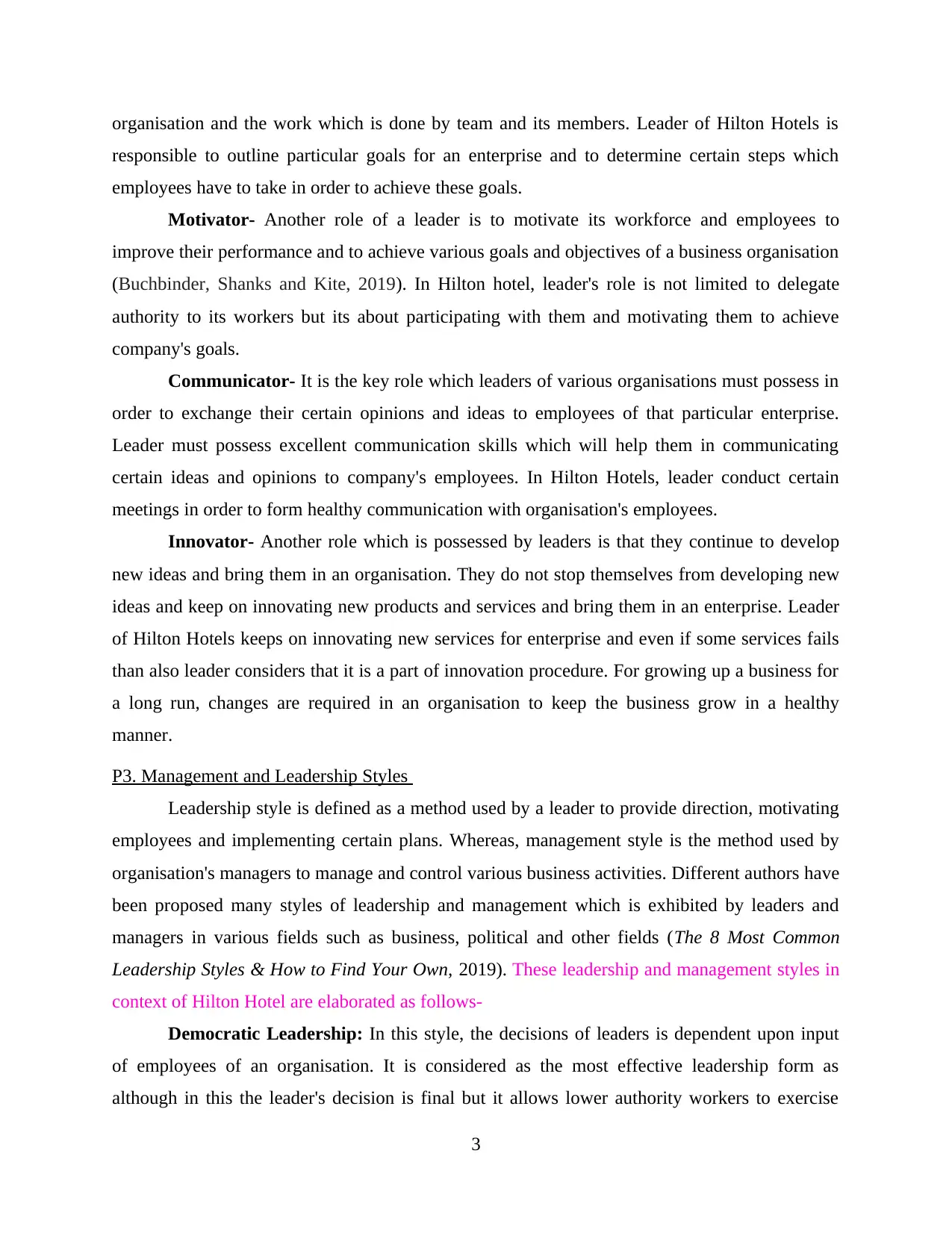
organisation and the work which is done by team and its members. Leader of Hilton Hotels is
responsible to outline particular goals for an enterprise and to determine certain steps which
employees have to take in order to achieve these goals.
Motivator- Another role of a leader is to motivate its workforce and employees to
improve their performance and to achieve various goals and objectives of a business organisation
(Buchbinder, Shanks and Kite, 2019). In Hilton hotel, leader's role is not limited to delegate
authority to its workers but its about participating with them and motivating them to achieve
company's goals.
Communicator- It is the key role which leaders of various organisations must possess in
order to exchange their certain opinions and ideas to employees of that particular enterprise.
Leader must possess excellent communication skills which will help them in communicating
certain ideas and opinions to company's employees. In Hilton Hotels, leader conduct certain
meetings in order to form healthy communication with organisation's employees.
Innovator- Another role which is possessed by leaders is that they continue to develop
new ideas and bring them in an organisation. They do not stop themselves from developing new
ideas and keep on innovating new products and services and bring them in an enterprise. Leader
of Hilton Hotels keeps on innovating new services for enterprise and even if some services fails
than also leader considers that it is a part of innovation procedure. For growing up a business for
a long run, changes are required in an organisation to keep the business grow in a healthy
manner.
P3. Management and Leadership Styles
Leadership style is defined as a method used by a leader to provide direction, motivating
employees and implementing certain plans. Whereas, management style is the method used by
organisation's managers to manage and control various business activities. Different authors have
been proposed many styles of leadership and management which is exhibited by leaders and
managers in various fields such as business, political and other fields (The 8 Most Common
Leadership Styles & How to Find Your Own, 2019). These leadership and management styles in
context of Hilton Hotel are elaborated as follows-
Democratic Leadership: In this style, the decisions of leaders is dependent upon input
of employees of an organisation. It is considered as the most effective leadership form as
although in this the leader's decision is final but it allows lower authority workers to exercise
3
responsible to outline particular goals for an enterprise and to determine certain steps which
employees have to take in order to achieve these goals.
Motivator- Another role of a leader is to motivate its workforce and employees to
improve their performance and to achieve various goals and objectives of a business organisation
(Buchbinder, Shanks and Kite, 2019). In Hilton hotel, leader's role is not limited to delegate
authority to its workers but its about participating with them and motivating them to achieve
company's goals.
Communicator- It is the key role which leaders of various organisations must possess in
order to exchange their certain opinions and ideas to employees of that particular enterprise.
Leader must possess excellent communication skills which will help them in communicating
certain ideas and opinions to company's employees. In Hilton Hotels, leader conduct certain
meetings in order to form healthy communication with organisation's employees.
Innovator- Another role which is possessed by leaders is that they continue to develop
new ideas and bring them in an organisation. They do not stop themselves from developing new
ideas and keep on innovating new products and services and bring them in an enterprise. Leader
of Hilton Hotels keeps on innovating new services for enterprise and even if some services fails
than also leader considers that it is a part of innovation procedure. For growing up a business for
a long run, changes are required in an organisation to keep the business grow in a healthy
manner.
P3. Management and Leadership Styles
Leadership style is defined as a method used by a leader to provide direction, motivating
employees and implementing certain plans. Whereas, management style is the method used by
organisation's managers to manage and control various business activities. Different authors have
been proposed many styles of leadership and management which is exhibited by leaders and
managers in various fields such as business, political and other fields (The 8 Most Common
Leadership Styles & How to Find Your Own, 2019). These leadership and management styles in
context of Hilton Hotel are elaborated as follows-
Democratic Leadership: In this style, the decisions of leaders is dependent upon input
of employees of an organisation. It is considered as the most effective leadership form as
although in this the leader's decision is final but it allows lower authority workers to exercise
3
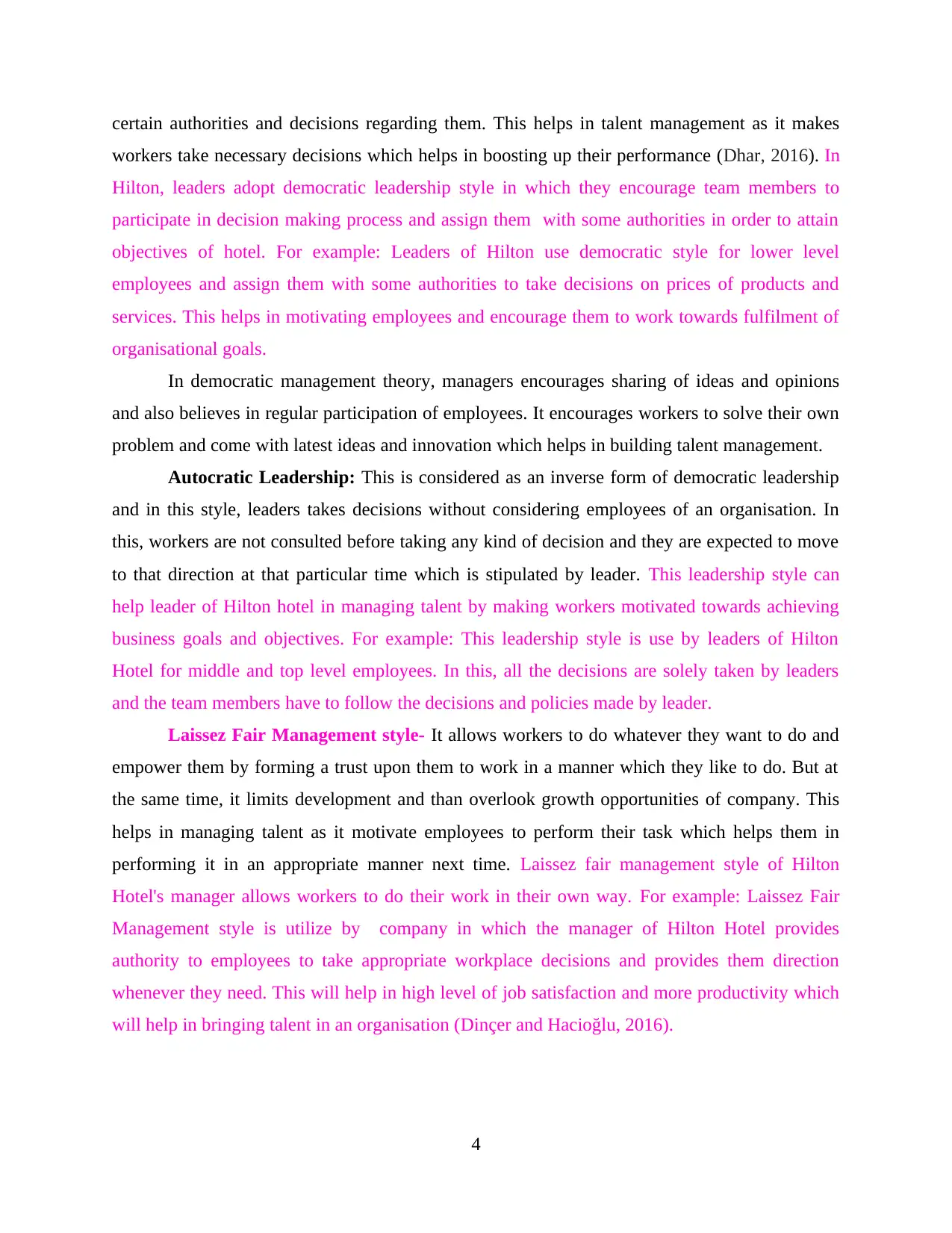
certain authorities and decisions regarding them. This helps in talent management as it makes
workers take necessary decisions which helps in boosting up their performance (Dhar, 2016). In
Hilton, leaders adopt democratic leadership style in which they encourage team members to
participate in decision making process and assign them with some authorities in order to attain
objectives of hotel. For example: Leaders of Hilton use democratic style for lower level
employees and assign them with some authorities to take decisions on prices of products and
services. This helps in motivating employees and encourage them to work towards fulfilment of
organisational goals.
In democratic management theory, managers encourages sharing of ideas and opinions
and also believes in regular participation of employees. It encourages workers to solve their own
problem and come with latest ideas and innovation which helps in building talent management.
Autocratic Leadership: This is considered as an inverse form of democratic leadership
and in this style, leaders takes decisions without considering employees of an organisation. In
this, workers are not consulted before taking any kind of decision and they are expected to move
to that direction at that particular time which is stipulated by leader. This leadership style can
help leader of Hilton hotel in managing talent by making workers motivated towards achieving
business goals and objectives. For example: This leadership style is use by leaders of Hilton
Hotel for middle and top level employees. In this, all the decisions are solely taken by leaders
and the team members have to follow the decisions and policies made by leader.
Laissez Fair Management style- It allows workers to do whatever they want to do and
empower them by forming a trust upon them to work in a manner which they like to do. But at
the same time, it limits development and than overlook growth opportunities of company. This
helps in managing talent as it motivate employees to perform their task which helps them in
performing it in an appropriate manner next time. Laissez fair management style of Hilton
Hotel's manager allows workers to do their work in their own way. For example: Laissez Fair
Management style is utilize by company in which the manager of Hilton Hotel provides
authority to employees to take appropriate workplace decisions and provides them direction
whenever they need. This will help in high level of job satisfaction and more productivity which
will help in bringing talent in an organisation (Dinçer and Hacioğlu, 2016).
4
workers take necessary decisions which helps in boosting up their performance (Dhar, 2016). In
Hilton, leaders adopt democratic leadership style in which they encourage team members to
participate in decision making process and assign them with some authorities in order to attain
objectives of hotel. For example: Leaders of Hilton use democratic style for lower level
employees and assign them with some authorities to take decisions on prices of products and
services. This helps in motivating employees and encourage them to work towards fulfilment of
organisational goals.
In democratic management theory, managers encourages sharing of ideas and opinions
and also believes in regular participation of employees. It encourages workers to solve their own
problem and come with latest ideas and innovation which helps in building talent management.
Autocratic Leadership: This is considered as an inverse form of democratic leadership
and in this style, leaders takes decisions without considering employees of an organisation. In
this, workers are not consulted before taking any kind of decision and they are expected to move
to that direction at that particular time which is stipulated by leader. This leadership style can
help leader of Hilton hotel in managing talent by making workers motivated towards achieving
business goals and objectives. For example: This leadership style is use by leaders of Hilton
Hotel for middle and top level employees. In this, all the decisions are solely taken by leaders
and the team members have to follow the decisions and policies made by leader.
Laissez Fair Management style- It allows workers to do whatever they want to do and
empower them by forming a trust upon them to work in a manner which they like to do. But at
the same time, it limits development and than overlook growth opportunities of company. This
helps in managing talent as it motivate employees to perform their task which helps them in
performing it in an appropriate manner next time. Laissez fair management style of Hilton
Hotel's manager allows workers to do their work in their own way. For example: Laissez Fair
Management style is utilize by company in which the manager of Hilton Hotel provides
authority to employees to take appropriate workplace decisions and provides them direction
whenever they need. This will help in high level of job satisfaction and more productivity which
will help in bringing talent in an organisation (Dinçer and Hacioğlu, 2016).
4
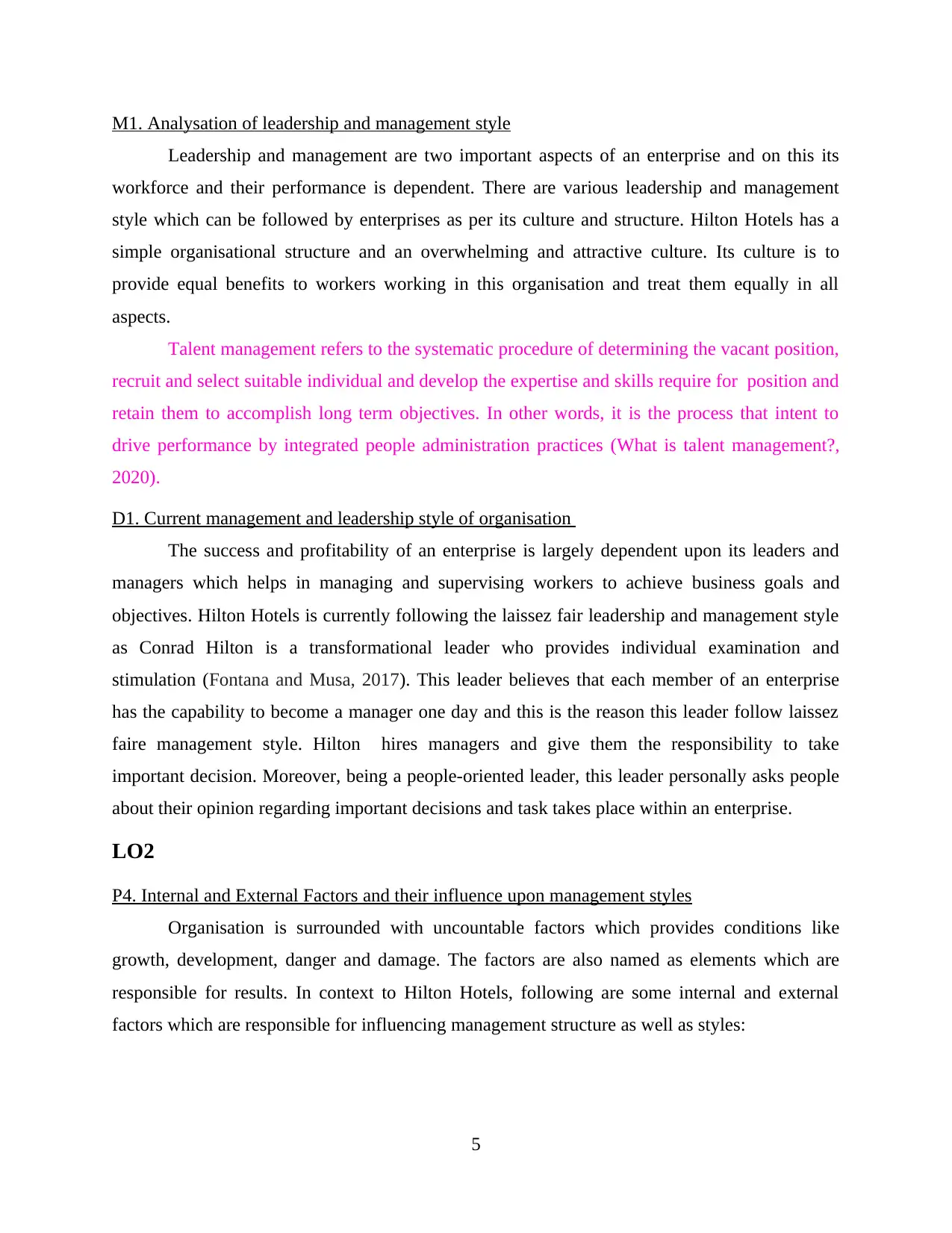
M1. Analysation of leadership and management style
Leadership and management are two important aspects of an enterprise and on this its
workforce and their performance is dependent. There are various leadership and management
style which can be followed by enterprises as per its culture and structure. Hilton Hotels has a
simple organisational structure and an overwhelming and attractive culture. Its culture is to
provide equal benefits to workers working in this organisation and treat them equally in all
aspects.
Talent management refers to the systematic procedure of determining the vacant position,
recruit and select suitable individual and develop the expertise and skills require for position and
retain them to accomplish long term objectives. In other words, it is the process that intent to
drive performance by integrated people administration practices (What is talent management?,
2020).
D1. Current management and leadership style of organisation
The success and profitability of an enterprise is largely dependent upon its leaders and
managers which helps in managing and supervising workers to achieve business goals and
objectives. Hilton Hotels is currently following the laissez fair leadership and management style
as Conrad Hilton is a transformational leader who provides individual examination and
stimulation (Fontana and Musa, 2017). This leader believes that each member of an enterprise
has the capability to become a manager one day and this is the reason this leader follow laissez
faire management style. Hilton hires managers and give them the responsibility to take
important decision. Moreover, being a people-oriented leader, this leader personally asks people
about their opinion regarding important decisions and task takes place within an enterprise.
LO2
P4. Internal and External Factors and their influence upon management styles
Organisation is surrounded with uncountable factors which provides conditions like
growth, development, danger and damage. The factors are also named as elements which are
responsible for results. In context to Hilton Hotels, following are some internal and external
factors which are responsible for influencing management structure as well as styles:
5
Leadership and management are two important aspects of an enterprise and on this its
workforce and their performance is dependent. There are various leadership and management
style which can be followed by enterprises as per its culture and structure. Hilton Hotels has a
simple organisational structure and an overwhelming and attractive culture. Its culture is to
provide equal benefits to workers working in this organisation and treat them equally in all
aspects.
Talent management refers to the systematic procedure of determining the vacant position,
recruit and select suitable individual and develop the expertise and skills require for position and
retain them to accomplish long term objectives. In other words, it is the process that intent to
drive performance by integrated people administration practices (What is talent management?,
2020).
D1. Current management and leadership style of organisation
The success and profitability of an enterprise is largely dependent upon its leaders and
managers which helps in managing and supervising workers to achieve business goals and
objectives. Hilton Hotels is currently following the laissez fair leadership and management style
as Conrad Hilton is a transformational leader who provides individual examination and
stimulation (Fontana and Musa, 2017). This leader believes that each member of an enterprise
has the capability to become a manager one day and this is the reason this leader follow laissez
faire management style. Hilton hires managers and give them the responsibility to take
important decision. Moreover, being a people-oriented leader, this leader personally asks people
about their opinion regarding important decisions and task takes place within an enterprise.
LO2
P4. Internal and External Factors and their influence upon management styles
Organisation is surrounded with uncountable factors which provides conditions like
growth, development, danger and damage. The factors are also named as elements which are
responsible for results. In context to Hilton Hotels, following are some internal and external
factors which are responsible for influencing management structure as well as styles:
5
Paraphrase This Document
Need a fresh take? Get an instant paraphrase of this document with our AI Paraphraser
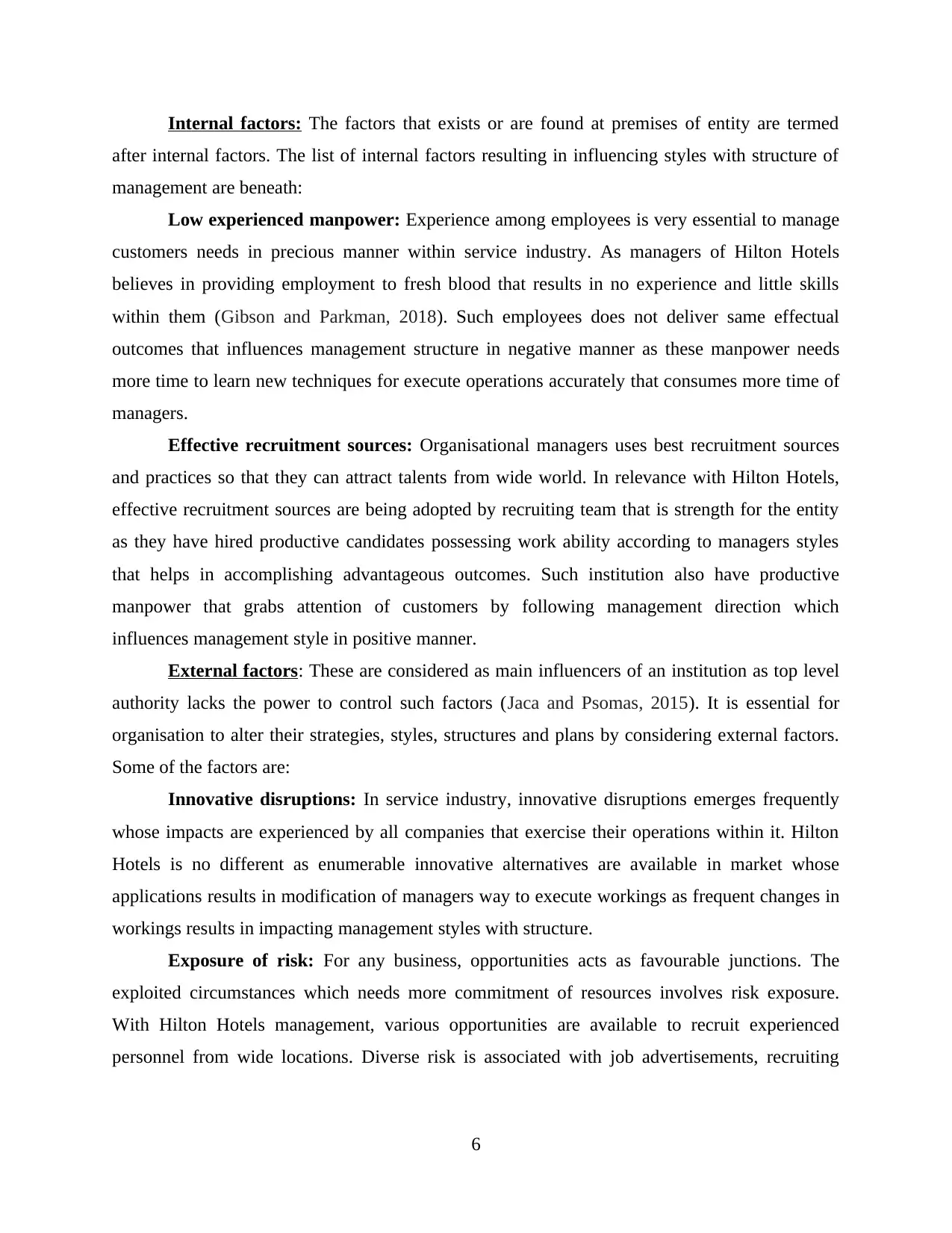
Internal factors: The factors that exists or are found at premises of entity are termed
after internal factors. The list of internal factors resulting in influencing styles with structure of
management are beneath:
Low experienced manpower: Experience among employees is very essential to manage
customers needs in precious manner within service industry. As managers of Hilton Hotels
believes in providing employment to fresh blood that results in no experience and little skills
within them (Gibson and Parkman, 2018). Such employees does not deliver same effectual
outcomes that influences management structure in negative manner as these manpower needs
more time to learn new techniques for execute operations accurately that consumes more time of
managers.
Effective recruitment sources: Organisational managers uses best recruitment sources
and practices so that they can attract talents from wide world. In relevance with Hilton Hotels,
effective recruitment sources are being adopted by recruiting team that is strength for the entity
as they have hired productive candidates possessing work ability according to managers styles
that helps in accomplishing advantageous outcomes. Such institution also have productive
manpower that grabs attention of customers by following management direction which
influences management style in positive manner.
External factors: These are considered as main influencers of an institution as top level
authority lacks the power to control such factors (Jaca and Psomas, 2015). It is essential for
organisation to alter their strategies, styles, structures and plans by considering external factors.
Some of the factors are:
Innovative disruptions: In service industry, innovative disruptions emerges frequently
whose impacts are experienced by all companies that exercise their operations within it. Hilton
Hotels is no different as enumerable innovative alternatives are available in market whose
applications results in modification of managers way to execute workings as frequent changes in
workings results in impacting management styles with structure.
Exposure of risk: For any business, opportunities acts as favourable junctions. The
exploited circumstances which needs more commitment of resources involves risk exposure.
With Hilton Hotels management, various opportunities are available to recruit experienced
personnel from wide locations. Diverse risk is associated with job advertisements, recruiting
6
after internal factors. The list of internal factors resulting in influencing styles with structure of
management are beneath:
Low experienced manpower: Experience among employees is very essential to manage
customers needs in precious manner within service industry. As managers of Hilton Hotels
believes in providing employment to fresh blood that results in no experience and little skills
within them (Gibson and Parkman, 2018). Such employees does not deliver same effectual
outcomes that influences management structure in negative manner as these manpower needs
more time to learn new techniques for execute operations accurately that consumes more time of
managers.
Effective recruitment sources: Organisational managers uses best recruitment sources
and practices so that they can attract talents from wide world. In relevance with Hilton Hotels,
effective recruitment sources are being adopted by recruiting team that is strength for the entity
as they have hired productive candidates possessing work ability according to managers styles
that helps in accomplishing advantageous outcomes. Such institution also have productive
manpower that grabs attention of customers by following management direction which
influences management style in positive manner.
External factors: These are considered as main influencers of an institution as top level
authority lacks the power to control such factors (Jaca and Psomas, 2015). It is essential for
organisation to alter their strategies, styles, structures and plans by considering external factors.
Some of the factors are:
Innovative disruptions: In service industry, innovative disruptions emerges frequently
whose impacts are experienced by all companies that exercise their operations within it. Hilton
Hotels is no different as enumerable innovative alternatives are available in market whose
applications results in modification of managers way to execute workings as frequent changes in
workings results in impacting management styles with structure.
Exposure of risk: For any business, opportunities acts as favourable junctions. The
exploited circumstances which needs more commitment of resources involves risk exposure.
With Hilton Hotels management, various opportunities are available to recruit experienced
personnel from wide locations. Diverse risk is associated with job advertisements, recruiting
6
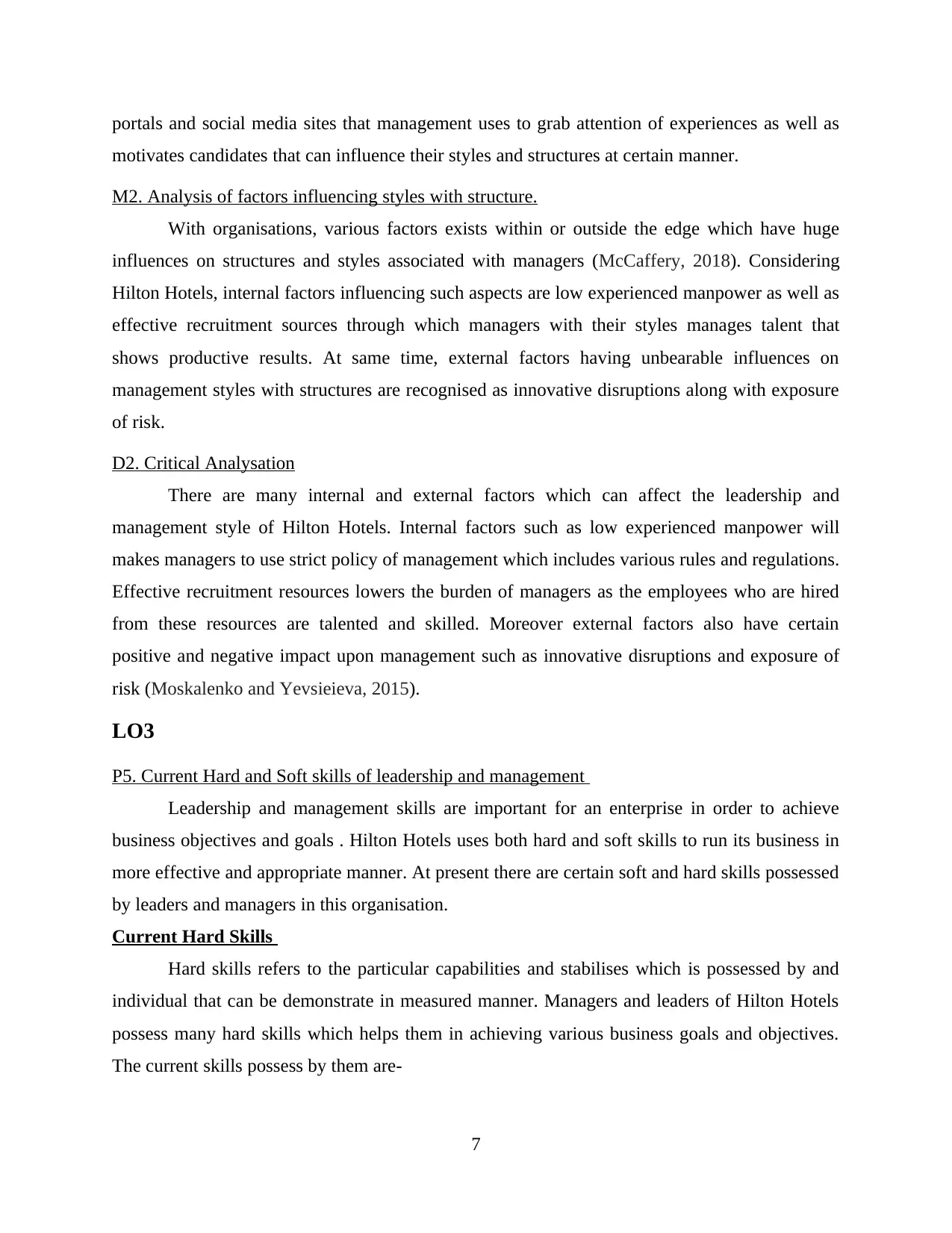
portals and social media sites that management uses to grab attention of experiences as well as
motivates candidates that can influence their styles and structures at certain manner.
M2. Analysis of factors influencing styles with structure.
With organisations, various factors exists within or outside the edge which have huge
influences on structures and styles associated with managers (McCaffery, 2018). Considering
Hilton Hotels, internal factors influencing such aspects are low experienced manpower as well as
effective recruitment sources through which managers with their styles manages talent that
shows productive results. At same time, external factors having unbearable influences on
management styles with structures are recognised as innovative disruptions along with exposure
of risk.
D2. Critical Analysation
There are many internal and external factors which can affect the leadership and
management style of Hilton Hotels. Internal factors such as low experienced manpower will
makes managers to use strict policy of management which includes various rules and regulations.
Effective recruitment resources lowers the burden of managers as the employees who are hired
from these resources are talented and skilled. Moreover external factors also have certain
positive and negative impact upon management such as innovative disruptions and exposure of
risk (Moskalenko and Yevsieieva, 2015).
LO3
P5. Current Hard and Soft skills of leadership and management
Leadership and management skills are important for an enterprise in order to achieve
business objectives and goals . Hilton Hotels uses both hard and soft skills to run its business in
more effective and appropriate manner. At present there are certain soft and hard skills possessed
by leaders and managers in this organisation.
Current Hard Skills
Hard skills refers to the particular capabilities and stabilises which is possessed by and
individual that can be demonstrate in measured manner. Managers and leaders of Hilton Hotels
possess many hard skills which helps them in achieving various business goals and objectives.
The current skills possess by them are-
7
motivates candidates that can influence their styles and structures at certain manner.
M2. Analysis of factors influencing styles with structure.
With organisations, various factors exists within or outside the edge which have huge
influences on structures and styles associated with managers (McCaffery, 2018). Considering
Hilton Hotels, internal factors influencing such aspects are low experienced manpower as well as
effective recruitment sources through which managers with their styles manages talent that
shows productive results. At same time, external factors having unbearable influences on
management styles with structures are recognised as innovative disruptions along with exposure
of risk.
D2. Critical Analysation
There are many internal and external factors which can affect the leadership and
management style of Hilton Hotels. Internal factors such as low experienced manpower will
makes managers to use strict policy of management which includes various rules and regulations.
Effective recruitment resources lowers the burden of managers as the employees who are hired
from these resources are talented and skilled. Moreover external factors also have certain
positive and negative impact upon management such as innovative disruptions and exposure of
risk (Moskalenko and Yevsieieva, 2015).
LO3
P5. Current Hard and Soft skills of leadership and management
Leadership and management skills are important for an enterprise in order to achieve
business objectives and goals . Hilton Hotels uses both hard and soft skills to run its business in
more effective and appropriate manner. At present there are certain soft and hard skills possessed
by leaders and managers in this organisation.
Current Hard Skills
Hard skills refers to the particular capabilities and stabilises which is possessed by and
individual that can be demonstrate in measured manner. Managers and leaders of Hilton Hotels
possess many hard skills which helps them in achieving various business goals and objectives.
The current skills possess by them are-
7
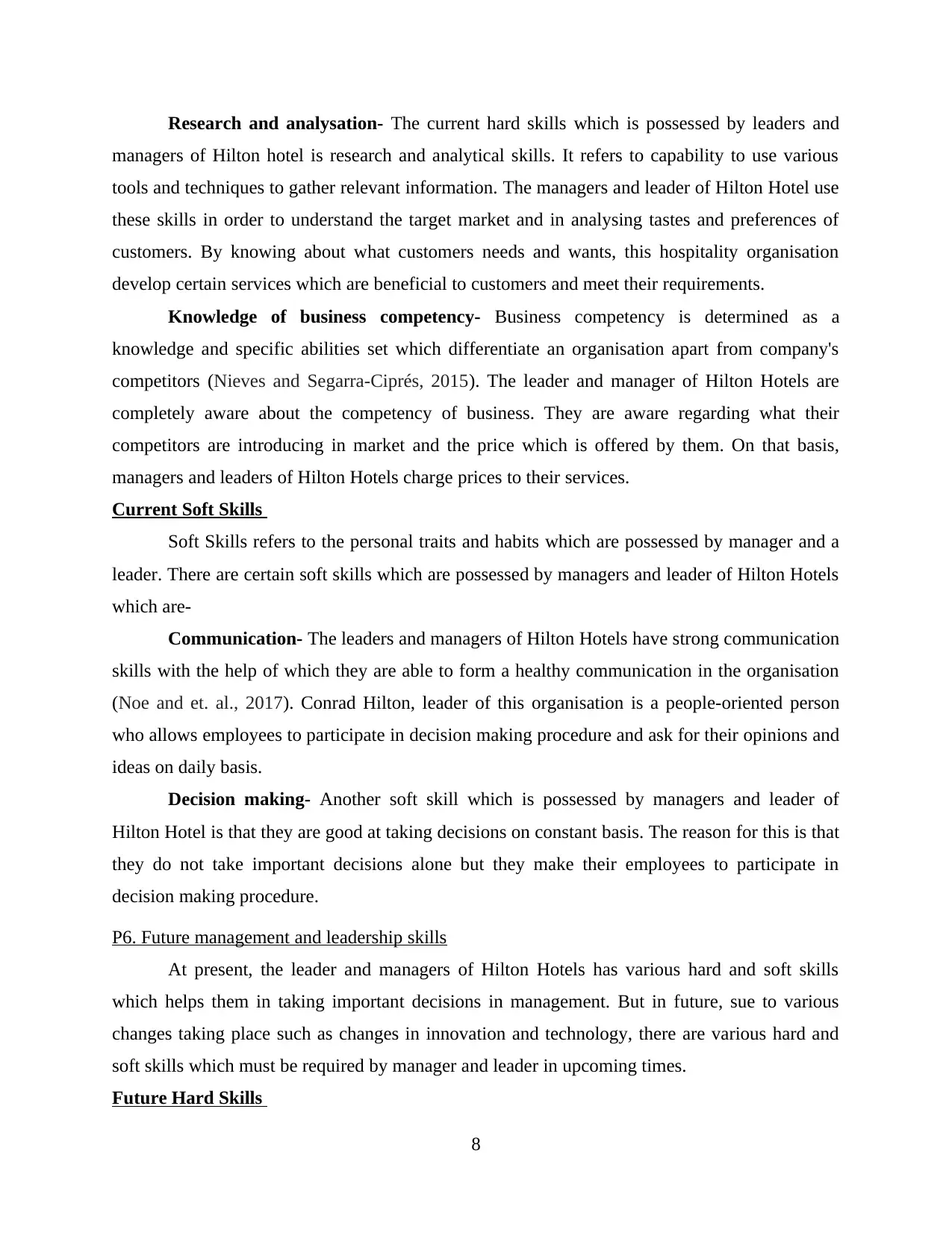
Research and analysation- The current hard skills which is possessed by leaders and
managers of Hilton hotel is research and analytical skills. It refers to capability to use various
tools and techniques to gather relevant information. The managers and leader of Hilton Hotel use
these skills in order to understand the target market and in analysing tastes and preferences of
customers. By knowing about what customers needs and wants, this hospitality organisation
develop certain services which are beneficial to customers and meet their requirements.
Knowledge of business competency- Business competency is determined as a
knowledge and specific abilities set which differentiate an organisation apart from company's
competitors (Nieves and Segarra-Ciprés, 2015). The leader and manager of Hilton Hotels are
completely aware about the competency of business. They are aware regarding what their
competitors are introducing in market and the price which is offered by them. On that basis,
managers and leaders of Hilton Hotels charge prices to their services.
Current Soft Skills
Soft Skills refers to the personal traits and habits which are possessed by manager and a
leader. There are certain soft skills which are possessed by managers and leader of Hilton Hotels
which are-
Communication- The leaders and managers of Hilton Hotels have strong communication
skills with the help of which they are able to form a healthy communication in the organisation
(Noe and et. al., 2017). Conrad Hilton, leader of this organisation is a people-oriented person
who allows employees to participate in decision making procedure and ask for their opinions and
ideas on daily basis.
Decision making- Another soft skill which is possessed by managers and leader of
Hilton Hotel is that they are good at taking decisions on constant basis. The reason for this is that
they do not take important decisions alone but they make their employees to participate in
decision making procedure.
P6. Future management and leadership skills
At present, the leader and managers of Hilton Hotels has various hard and soft skills
which helps them in taking important decisions in management. But in future, sue to various
changes taking place such as changes in innovation and technology, there are various hard and
soft skills which must be required by manager and leader in upcoming times.
Future Hard Skills
8
managers of Hilton hotel is research and analytical skills. It refers to capability to use various
tools and techniques to gather relevant information. The managers and leader of Hilton Hotel use
these skills in order to understand the target market and in analysing tastes and preferences of
customers. By knowing about what customers needs and wants, this hospitality organisation
develop certain services which are beneficial to customers and meet their requirements.
Knowledge of business competency- Business competency is determined as a
knowledge and specific abilities set which differentiate an organisation apart from company's
competitors (Nieves and Segarra-Ciprés, 2015). The leader and manager of Hilton Hotels are
completely aware about the competency of business. They are aware regarding what their
competitors are introducing in market and the price which is offered by them. On that basis,
managers and leaders of Hilton Hotels charge prices to their services.
Current Soft Skills
Soft Skills refers to the personal traits and habits which are possessed by manager and a
leader. There are certain soft skills which are possessed by managers and leader of Hilton Hotels
which are-
Communication- The leaders and managers of Hilton Hotels have strong communication
skills with the help of which they are able to form a healthy communication in the organisation
(Noe and et. al., 2017). Conrad Hilton, leader of this organisation is a people-oriented person
who allows employees to participate in decision making procedure and ask for their opinions and
ideas on daily basis.
Decision making- Another soft skill which is possessed by managers and leader of
Hilton Hotel is that they are good at taking decisions on constant basis. The reason for this is that
they do not take important decisions alone but they make their employees to participate in
decision making procedure.
P6. Future management and leadership skills
At present, the leader and managers of Hilton Hotels has various hard and soft skills
which helps them in taking important decisions in management. But in future, sue to various
changes taking place such as changes in innovation and technology, there are various hard and
soft skills which must be required by manager and leader in upcoming times.
Future Hard Skills
8
Secure Best Marks with AI Grader
Need help grading? Try our AI Grader for instant feedback on your assignments.
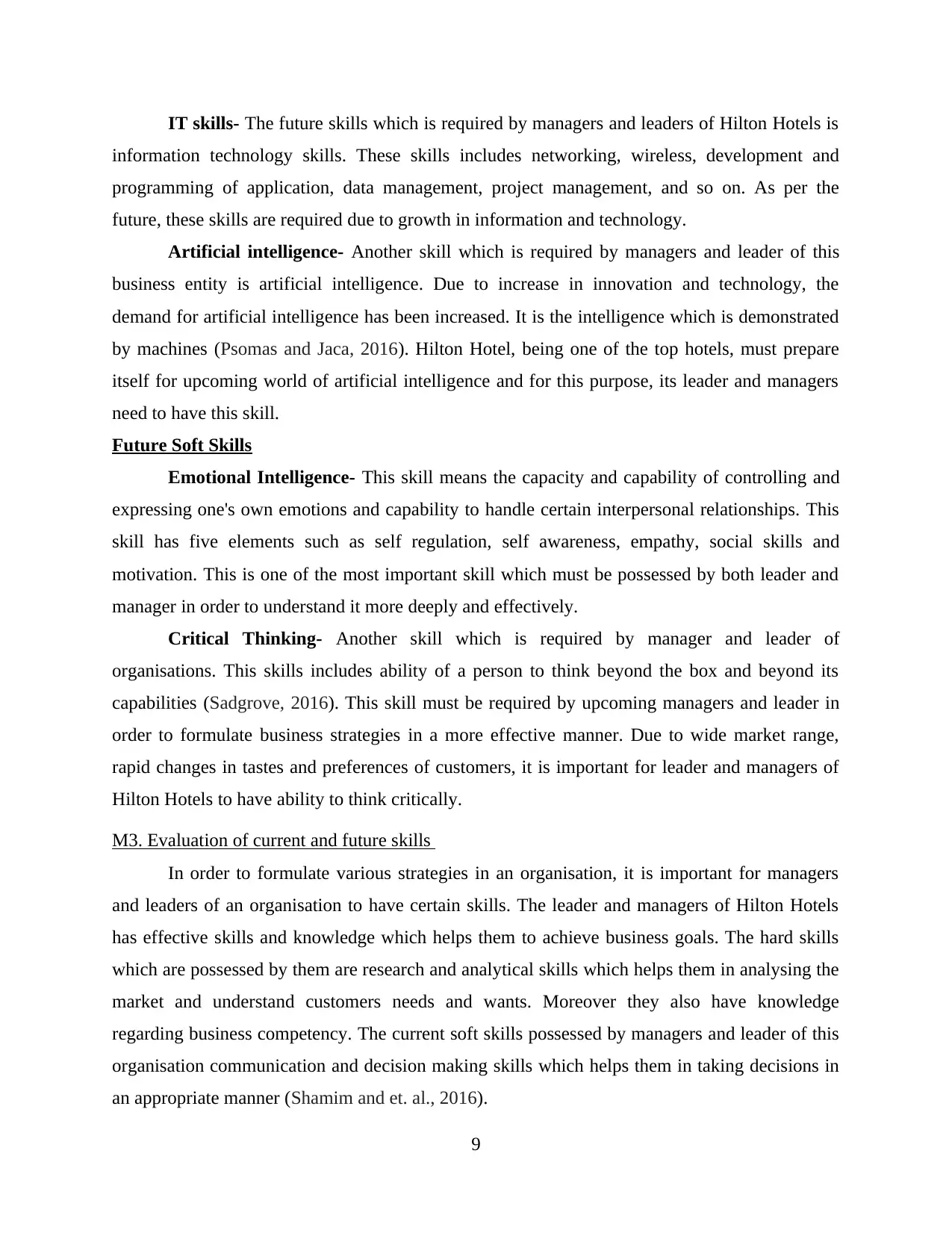
IT skills- The future skills which is required by managers and leaders of Hilton Hotels is
information technology skills. These skills includes networking, wireless, development and
programming of application, data management, project management, and so on. As per the
future, these skills are required due to growth in information and technology.
Artificial intelligence- Another skill which is required by managers and leader of this
business entity is artificial intelligence. Due to increase in innovation and technology, the
demand for artificial intelligence has been increased. It is the intelligence which is demonstrated
by machines (Psomas and Jaca, 2016). Hilton Hotel, being one of the top hotels, must prepare
itself for upcoming world of artificial intelligence and for this purpose, its leader and managers
need to have this skill.
Future Soft Skills
Emotional Intelligence- This skill means the capacity and capability of controlling and
expressing one's own emotions and capability to handle certain interpersonal relationships. This
skill has five elements such as self regulation, self awareness, empathy, social skills and
motivation. This is one of the most important skill which must be possessed by both leader and
manager in order to understand it more deeply and effectively.
Critical Thinking- Another skill which is required by manager and leader of
organisations. This skills includes ability of a person to think beyond the box and beyond its
capabilities (Sadgrove, 2016). This skill must be required by upcoming managers and leader in
order to formulate business strategies in a more effective manner. Due to wide market range,
rapid changes in tastes and preferences of customers, it is important for leader and managers of
Hilton Hotels to have ability to think critically.
M3. Evaluation of current and future skills
In order to formulate various strategies in an organisation, it is important for managers
and leaders of an organisation to have certain skills. The leader and managers of Hilton Hotels
has effective skills and knowledge which helps them to achieve business goals. The hard skills
which are possessed by them are research and analytical skills which helps them in analysing the
market and understand customers needs and wants. Moreover they also have knowledge
regarding business competency. The current soft skills possessed by managers and leader of this
organisation communication and decision making skills which helps them in taking decisions in
an appropriate manner (Shamim and et. al., 2016).
9
information technology skills. These skills includes networking, wireless, development and
programming of application, data management, project management, and so on. As per the
future, these skills are required due to growth in information and technology.
Artificial intelligence- Another skill which is required by managers and leader of this
business entity is artificial intelligence. Due to increase in innovation and technology, the
demand for artificial intelligence has been increased. It is the intelligence which is demonstrated
by machines (Psomas and Jaca, 2016). Hilton Hotel, being one of the top hotels, must prepare
itself for upcoming world of artificial intelligence and for this purpose, its leader and managers
need to have this skill.
Future Soft Skills
Emotional Intelligence- This skill means the capacity and capability of controlling and
expressing one's own emotions and capability to handle certain interpersonal relationships. This
skill has five elements such as self regulation, self awareness, empathy, social skills and
motivation. This is one of the most important skill which must be possessed by both leader and
manager in order to understand it more deeply and effectively.
Critical Thinking- Another skill which is required by manager and leader of
organisations. This skills includes ability of a person to think beyond the box and beyond its
capabilities (Sadgrove, 2016). This skill must be required by upcoming managers and leader in
order to formulate business strategies in a more effective manner. Due to wide market range,
rapid changes in tastes and preferences of customers, it is important for leader and managers of
Hilton Hotels to have ability to think critically.
M3. Evaluation of current and future skills
In order to formulate various strategies in an organisation, it is important for managers
and leaders of an organisation to have certain skills. The leader and managers of Hilton Hotels
has effective skills and knowledge which helps them to achieve business goals. The hard skills
which are possessed by them are research and analytical skills which helps them in analysing the
market and understand customers needs and wants. Moreover they also have knowledge
regarding business competency. The current soft skills possessed by managers and leader of this
organisation communication and decision making skills which helps them in taking decisions in
an appropriate manner (Shamim and et. al., 2016).
9
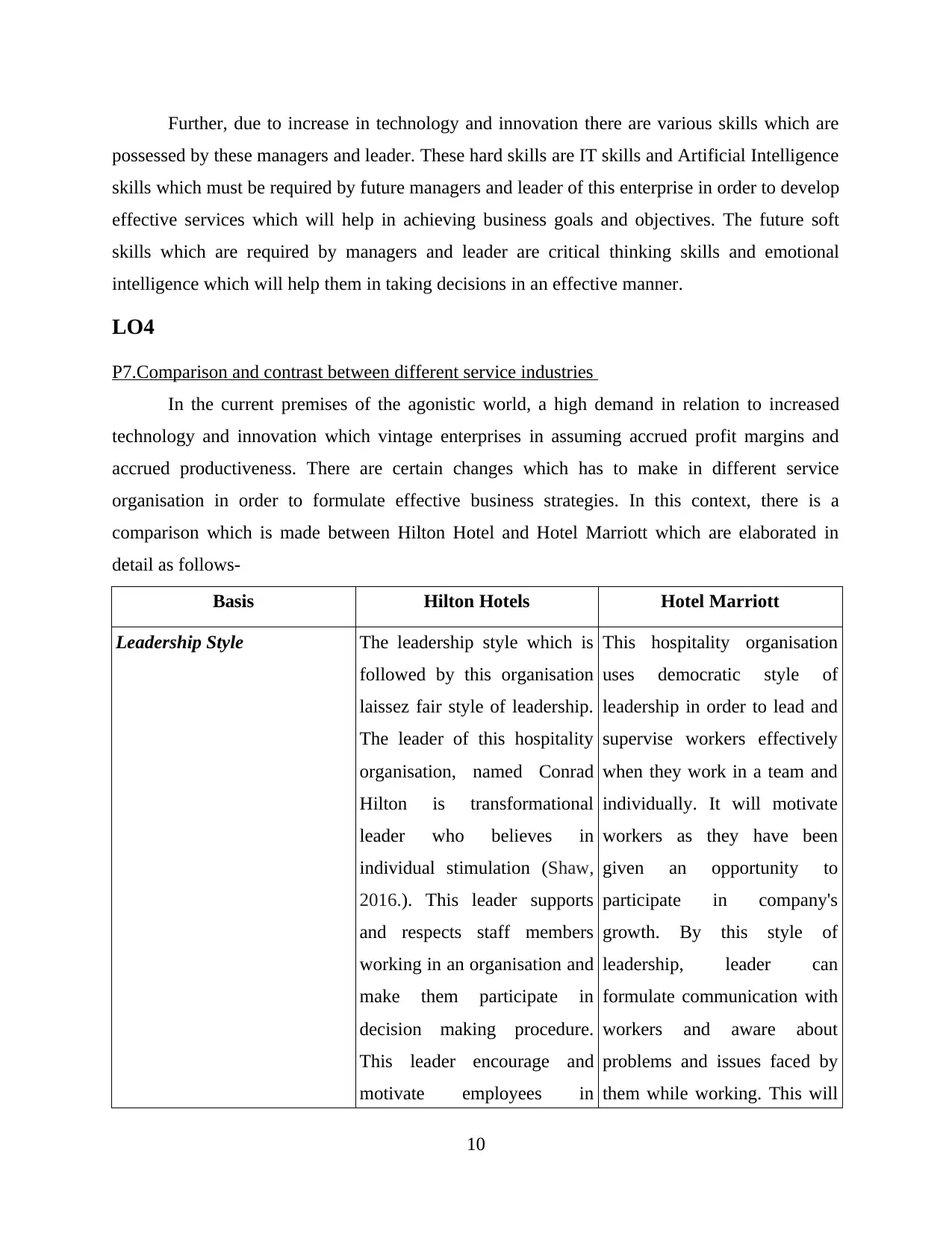
Further, due to increase in technology and innovation there are various skills which are
possessed by these managers and leader. These hard skills are IT skills and Artificial Intelligence
skills which must be required by future managers and leader of this enterprise in order to develop
effective services which will help in achieving business goals and objectives. The future soft
skills which are required by managers and leader are critical thinking skills and emotional
intelligence which will help them in taking decisions in an effective manner.
LO4
P7.Comparison and contrast between different service industries
In the current premises of the agonistic world, a high demand in relation to increased
technology and innovation which vintage enterprises in assuming accrued profit margins and
accrued productiveness. There are certain changes which has to make in different service
organisation in order to formulate effective business strategies. In this context, there is a
comparison which is made between Hilton Hotel and Hotel Marriott which are elaborated in
detail as follows-
Basis Hilton Hotels Hotel Marriott
Leadership Style The leadership style which is
followed by this organisation
laissez fair style of leadership.
The leader of this hospitality
organisation, named Conrad
Hilton is transformational
leader who believes in
individual stimulation (Shaw,
2016.). This leader supports
and respects staff members
working in an organisation and
make them participate in
decision making procedure.
This leader encourage and
motivate employees in
This hospitality organisation
uses democratic style of
leadership in order to lead and
supervise workers effectively
when they work in a team and
individually. It will motivate
workers as they have been
given an opportunity to
participate in company's
growth. By this style of
leadership, leader can
formulate communication with
workers and aware about
problems and issues faced by
them while working. This will
10
possessed by these managers and leader. These hard skills are IT skills and Artificial Intelligence
skills which must be required by future managers and leader of this enterprise in order to develop
effective services which will help in achieving business goals and objectives. The future soft
skills which are required by managers and leader are critical thinking skills and emotional
intelligence which will help them in taking decisions in an effective manner.
LO4
P7.Comparison and contrast between different service industries
In the current premises of the agonistic world, a high demand in relation to increased
technology and innovation which vintage enterprises in assuming accrued profit margins and
accrued productiveness. There are certain changes which has to make in different service
organisation in order to formulate effective business strategies. In this context, there is a
comparison which is made between Hilton Hotel and Hotel Marriott which are elaborated in
detail as follows-
Basis Hilton Hotels Hotel Marriott
Leadership Style The leadership style which is
followed by this organisation
laissez fair style of leadership.
The leader of this hospitality
organisation, named Conrad
Hilton is transformational
leader who believes in
individual stimulation (Shaw,
2016.). This leader supports
and respects staff members
working in an organisation and
make them participate in
decision making procedure.
This leader encourage and
motivate employees in
This hospitality organisation
uses democratic style of
leadership in order to lead and
supervise workers effectively
when they work in a team and
individually. It will motivate
workers as they have been
given an opportunity to
participate in company's
growth. By this style of
leadership, leader can
formulate communication with
workers and aware about
problems and issues faced by
them while working. This will
10
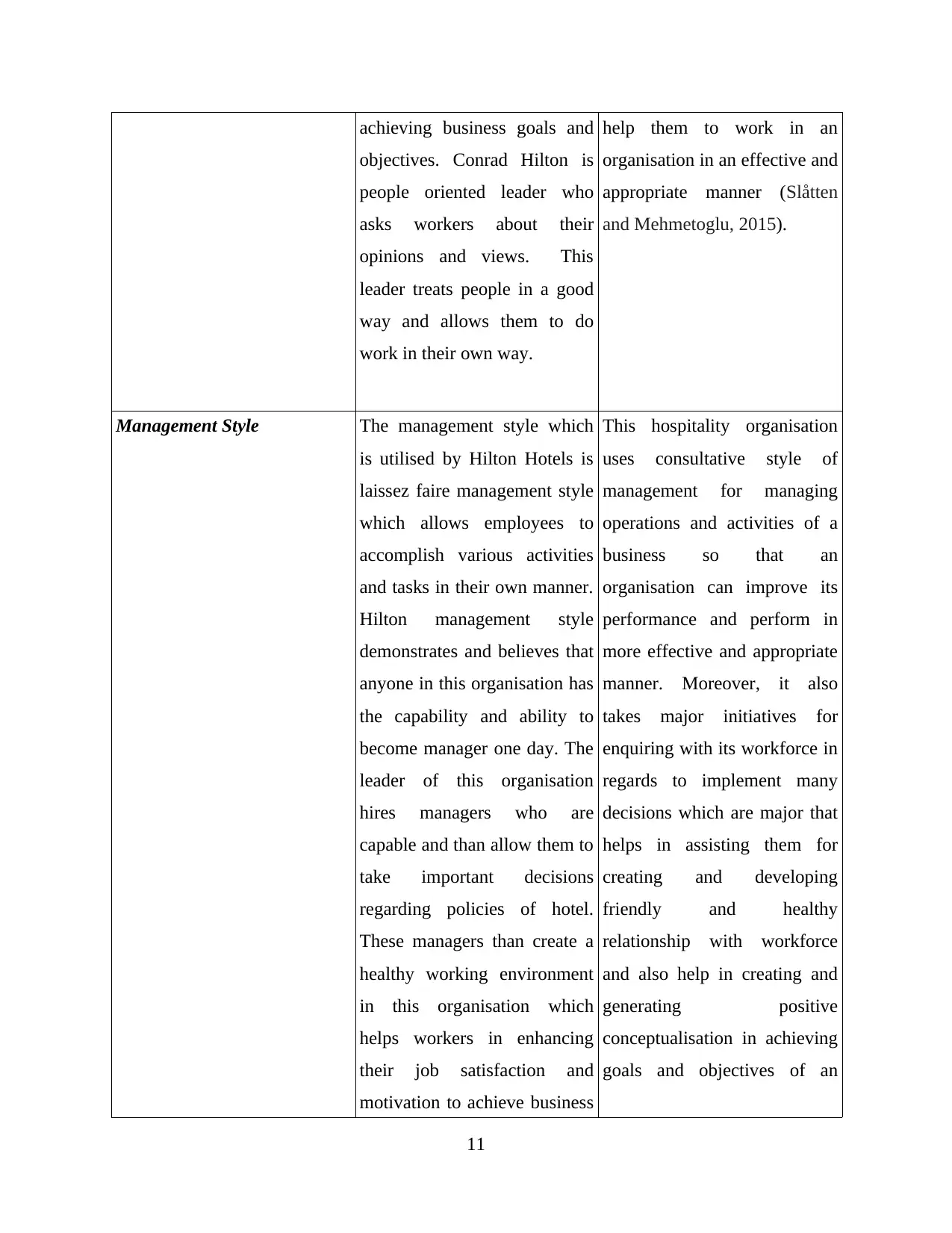
achieving business goals and
objectives. Conrad Hilton is
people oriented leader who
asks workers about their
opinions and views. This
leader treats people in a good
way and allows them to do
work in their own way.
help them to work in an
organisation in an effective and
appropriate manner (Slåtten
and Mehmetoglu, 2015).
Management Style The management style which
is utilised by Hilton Hotels is
laissez faire management style
which allows employees to
accomplish various activities
and tasks in their own manner.
Hilton management style
demonstrates and believes that
anyone in this organisation has
the capability and ability to
become manager one day. The
leader of this organisation
hires managers who are
capable and than allow them to
take important decisions
regarding policies of hotel.
These managers than create a
healthy working environment
in this organisation which
helps workers in enhancing
their job satisfaction and
motivation to achieve business
This hospitality organisation
uses consultative style of
management for managing
operations and activities of a
business so that an
organisation can improve its
performance and perform in
more effective and appropriate
manner. Moreover, it also
takes major initiatives for
enquiring with its workforce in
regards to implement many
decisions which are major that
helps in assisting them for
creating and developing
friendly and healthy
relationship with workforce
and also help in creating and
generating positive
conceptualisation in achieving
goals and objectives of an
11
objectives. Conrad Hilton is
people oriented leader who
asks workers about their
opinions and views. This
leader treats people in a good
way and allows them to do
work in their own way.
help them to work in an
organisation in an effective and
appropriate manner (Slåtten
and Mehmetoglu, 2015).
Management Style The management style which
is utilised by Hilton Hotels is
laissez faire management style
which allows employees to
accomplish various activities
and tasks in their own manner.
Hilton management style
demonstrates and believes that
anyone in this organisation has
the capability and ability to
become manager one day. The
leader of this organisation
hires managers who are
capable and than allow them to
take important decisions
regarding policies of hotel.
These managers than create a
healthy working environment
in this organisation which
helps workers in enhancing
their job satisfaction and
motivation to achieve business
This hospitality organisation
uses consultative style of
management for managing
operations and activities of a
business so that an
organisation can improve its
performance and perform in
more effective and appropriate
manner. Moreover, it also
takes major initiatives for
enquiring with its workforce in
regards to implement many
decisions which are major that
helps in assisting them for
creating and developing
friendly and healthy
relationship with workforce
and also help in creating and
generating positive
conceptualisation in achieving
goals and objectives of an
11
Paraphrase This Document
Need a fresh take? Get an instant paraphrase of this document with our AI Paraphraser
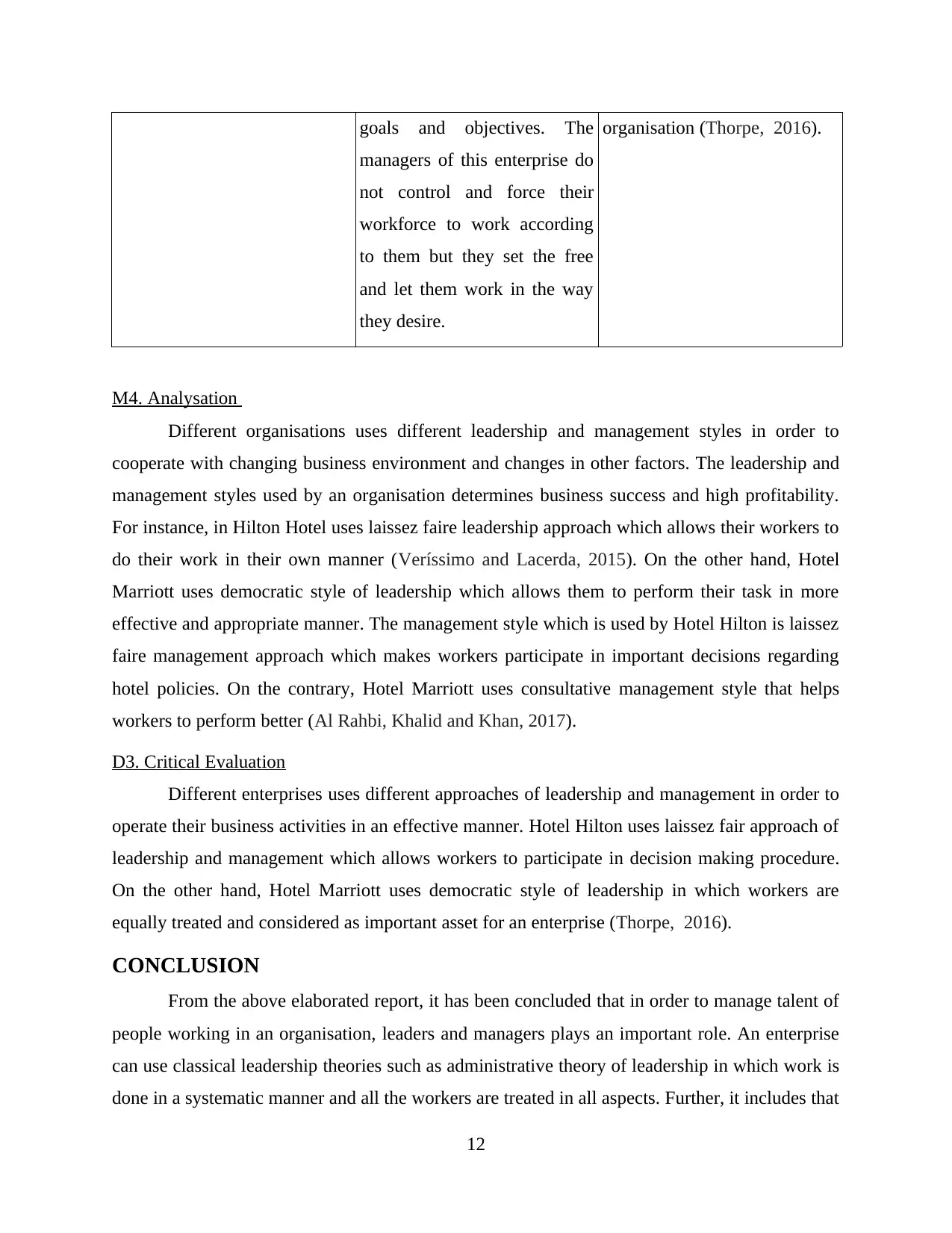
goals and objectives. The
managers of this enterprise do
not control and force their
workforce to work according
to them but they set the free
and let them work in the way
they desire.
organisation (Thorpe, 2016).
M4. Analysation
Different organisations uses different leadership and management styles in order to
cooperate with changing business environment and changes in other factors. The leadership and
management styles used by an organisation determines business success and high profitability.
For instance, in Hilton Hotel uses laissez faire leadership approach which allows their workers to
do their work in their own manner (Veríssimo and Lacerda, 2015). On the other hand, Hotel
Marriott uses democratic style of leadership which allows them to perform their task in more
effective and appropriate manner. The management style which is used by Hotel Hilton is laissez
faire management approach which makes workers participate in important decisions regarding
hotel policies. On the contrary, Hotel Marriott uses consultative management style that helps
workers to perform better (Al Rahbi, Khalid and Khan, 2017).
D3. Critical Evaluation
Different enterprises uses different approaches of leadership and management in order to
operate their business activities in an effective manner. Hotel Hilton uses laissez fair approach of
leadership and management which allows workers to participate in decision making procedure.
On the other hand, Hotel Marriott uses democratic style of leadership in which workers are
equally treated and considered as important asset for an enterprise (Thorpe, 2016).
CONCLUSION
From the above elaborated report, it has been concluded that in order to manage talent of
people working in an organisation, leaders and managers plays an important role. An enterprise
can use classical leadership theories such as administrative theory of leadership in which work is
done in a systematic manner and all the workers are treated in all aspects. Further, it includes that
12
managers of this enterprise do
not control and force their
workforce to work according
to them but they set the free
and let them work in the way
they desire.
organisation (Thorpe, 2016).
M4. Analysation
Different organisations uses different leadership and management styles in order to
cooperate with changing business environment and changes in other factors. The leadership and
management styles used by an organisation determines business success and high profitability.
For instance, in Hilton Hotel uses laissez faire leadership approach which allows their workers to
do their work in their own manner (Veríssimo and Lacerda, 2015). On the other hand, Hotel
Marriott uses democratic style of leadership which allows them to perform their task in more
effective and appropriate manner. The management style which is used by Hotel Hilton is laissez
faire management approach which makes workers participate in important decisions regarding
hotel policies. On the contrary, Hotel Marriott uses consultative management style that helps
workers to perform better (Al Rahbi, Khalid and Khan, 2017).
D3. Critical Evaluation
Different enterprises uses different approaches of leadership and management in order to
operate their business activities in an effective manner. Hotel Hilton uses laissez fair approach of
leadership and management which allows workers to participate in decision making procedure.
On the other hand, Hotel Marriott uses democratic style of leadership in which workers are
equally treated and considered as important asset for an enterprise (Thorpe, 2016).
CONCLUSION
From the above elaborated report, it has been concluded that in order to manage talent of
people working in an organisation, leaders and managers plays an important role. An enterprise
can use classical leadership theories such as administrative theory of leadership in which work is
done in a systematic manner and all the workers are treated in all aspects. Further, it includes that
12
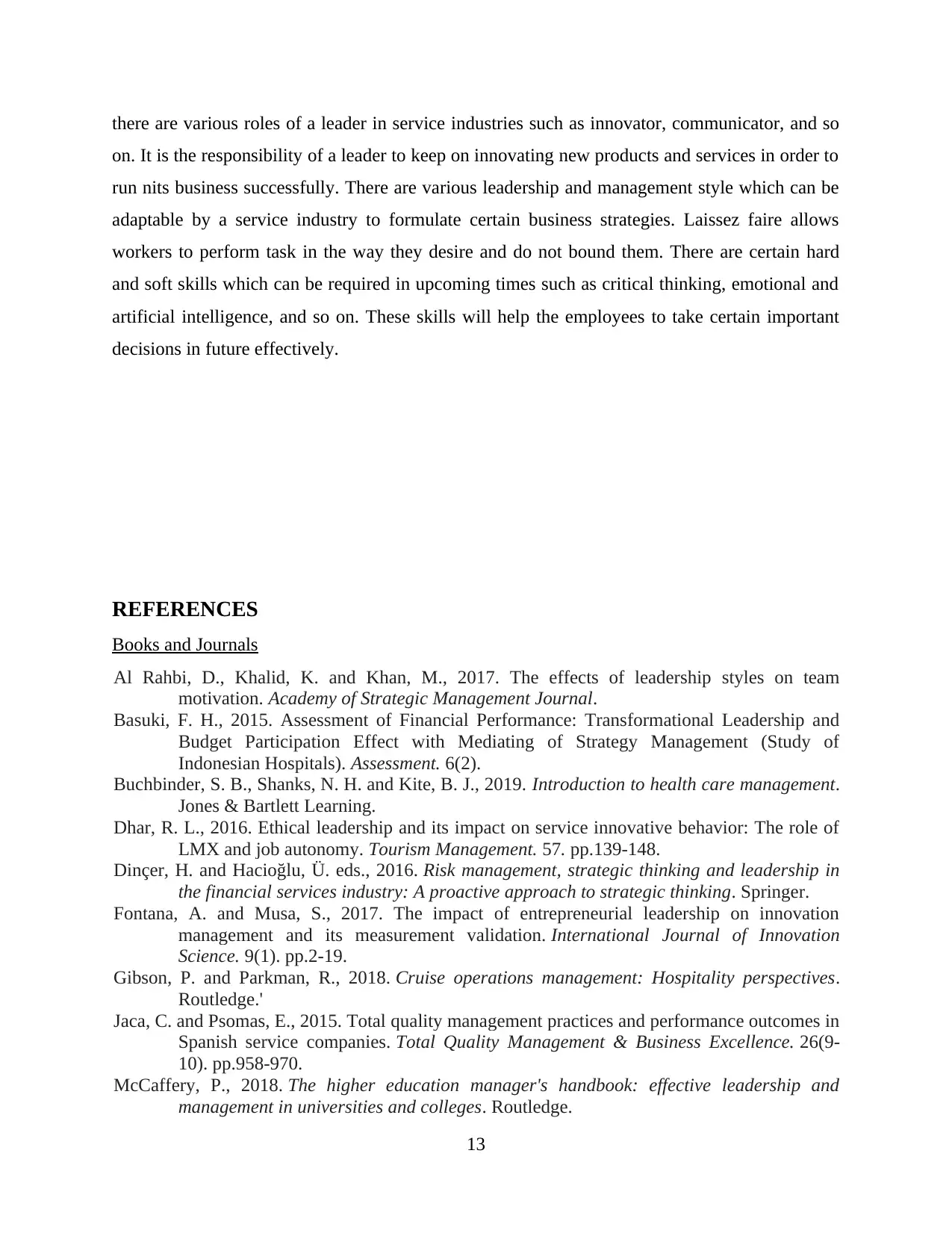
there are various roles of a leader in service industries such as innovator, communicator, and so
on. It is the responsibility of a leader to keep on innovating new products and services in order to
run nits business successfully. There are various leadership and management style which can be
adaptable by a service industry to formulate certain business strategies. Laissez faire allows
workers to perform task in the way they desire and do not bound them. There are certain hard
and soft skills which can be required in upcoming times such as critical thinking, emotional and
artificial intelligence, and so on. These skills will help the employees to take certain important
decisions in future effectively.
REFERENCES
Books and Journals
Al Rahbi, D., Khalid, K. and Khan, M., 2017. The effects of leadership styles on team
motivation. Academy of Strategic Management Journal.
Basuki, F. H., 2015. Assessment of Financial Performance: Transformational Leadership and
Budget Participation Effect with Mediating of Strategy Management (Study of
Indonesian Hospitals). Assessment. 6(2).
Buchbinder, S. B., Shanks, N. H. and Kite, B. J., 2019. Introduction to health care management.
Jones & Bartlett Learning.
Dhar, R. L., 2016. Ethical leadership and its impact on service innovative behavior: The role of
LMX and job autonomy. Tourism Management. 57. pp.139-148.
Dinçer, H. and Hacioğlu, Ü. eds., 2016. Risk management, strategic thinking and leadership in
the financial services industry: A proactive approach to strategic thinking. Springer.
Fontana, A. and Musa, S., 2017. The impact of entrepreneurial leadership on innovation
management and its measurement validation. International Journal of Innovation
Science. 9(1). pp.2-19.
Gibson, P. and Parkman, R., 2018. Cruise operations management: Hospitality perspectives.
Routledge.'
Jaca, C. and Psomas, E., 2015. Total quality management practices and performance outcomes in
Spanish service companies. Total Quality Management & Business Excellence. 26(9-
10). pp.958-970.
McCaffery, P., 2018. The higher education manager's handbook: effective leadership and
management in universities and colleges. Routledge.
13
on. It is the responsibility of a leader to keep on innovating new products and services in order to
run nits business successfully. There are various leadership and management style which can be
adaptable by a service industry to formulate certain business strategies. Laissez faire allows
workers to perform task in the way they desire and do not bound them. There are certain hard
and soft skills which can be required in upcoming times such as critical thinking, emotional and
artificial intelligence, and so on. These skills will help the employees to take certain important
decisions in future effectively.
REFERENCES
Books and Journals
Al Rahbi, D., Khalid, K. and Khan, M., 2017. The effects of leadership styles on team
motivation. Academy of Strategic Management Journal.
Basuki, F. H., 2015. Assessment of Financial Performance: Transformational Leadership and
Budget Participation Effect with Mediating of Strategy Management (Study of
Indonesian Hospitals). Assessment. 6(2).
Buchbinder, S. B., Shanks, N. H. and Kite, B. J., 2019. Introduction to health care management.
Jones & Bartlett Learning.
Dhar, R. L., 2016. Ethical leadership and its impact on service innovative behavior: The role of
LMX and job autonomy. Tourism Management. 57. pp.139-148.
Dinçer, H. and Hacioğlu, Ü. eds., 2016. Risk management, strategic thinking and leadership in
the financial services industry: A proactive approach to strategic thinking. Springer.
Fontana, A. and Musa, S., 2017. The impact of entrepreneurial leadership on innovation
management and its measurement validation. International Journal of Innovation
Science. 9(1). pp.2-19.
Gibson, P. and Parkman, R., 2018. Cruise operations management: Hospitality perspectives.
Routledge.'
Jaca, C. and Psomas, E., 2015. Total quality management practices and performance outcomes in
Spanish service companies. Total Quality Management & Business Excellence. 26(9-
10). pp.958-970.
McCaffery, P., 2018. The higher education manager's handbook: effective leadership and
management in universities and colleges. Routledge.
13
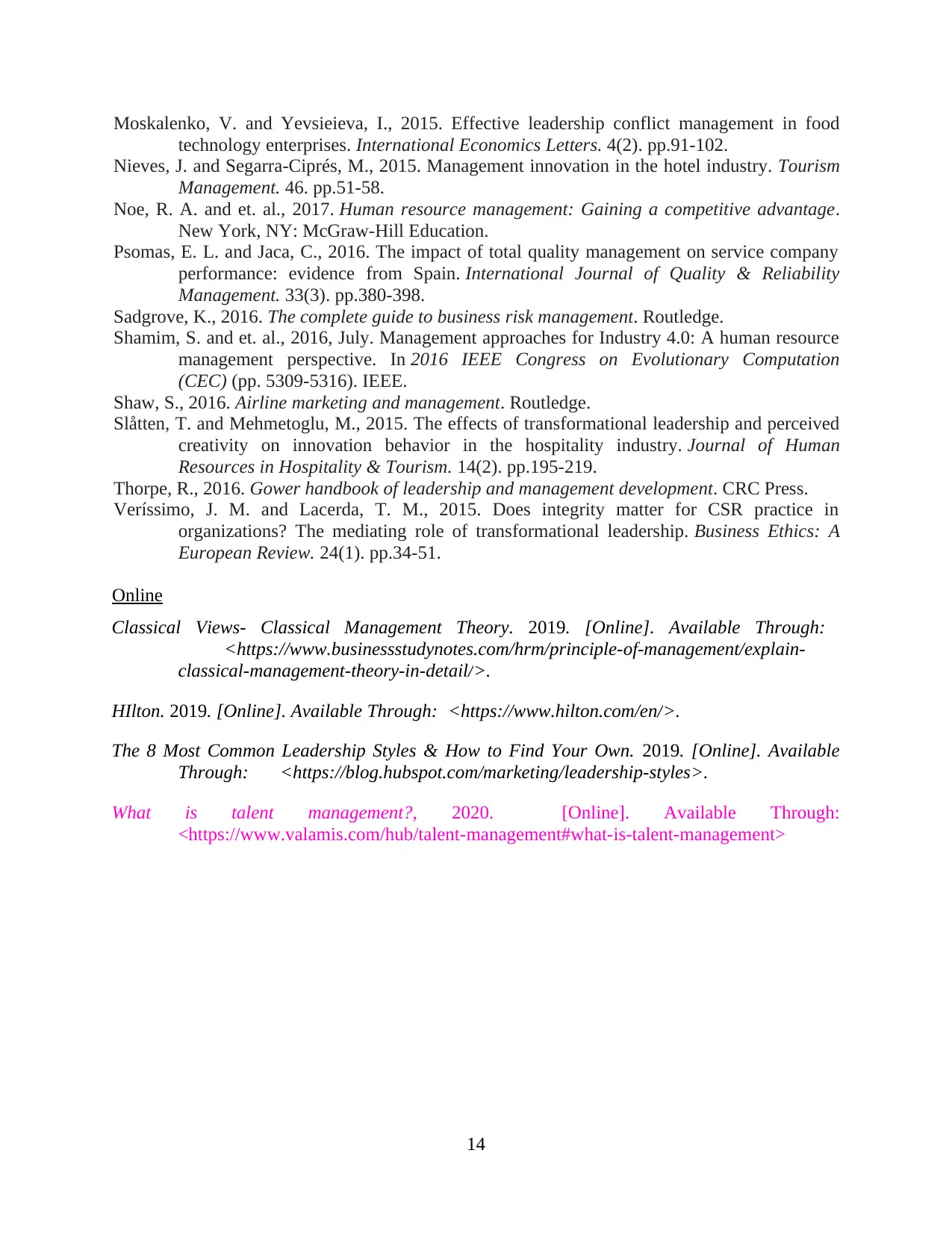
Moskalenko, V. and Yevsieieva, I., 2015. Effective leadership conflict management in food
technology enterprises. International Economics Letters. 4(2). pp.91-102.
Nieves, J. and Segarra-Ciprés, M., 2015. Management innovation in the hotel industry. Tourism
Management. 46. pp.51-58.
Noe, R. A. and et. al., 2017. Human resource management: Gaining a competitive advantage.
New York, NY: McGraw-Hill Education.
Psomas, E. L. and Jaca, C., 2016. The impact of total quality management on service company
performance: evidence from Spain. International Journal of Quality & Reliability
Management. 33(3). pp.380-398.
Sadgrove, K., 2016. The complete guide to business risk management. Routledge.
Shamim, S. and et. al., 2016, July. Management approaches for Industry 4.0: A human resource
management perspective. In 2016 IEEE Congress on Evolutionary Computation
(CEC) (pp. 5309-5316). IEEE.
Shaw, S., 2016. Airline marketing and management. Routledge.
Slåtten, T. and Mehmetoglu, M., 2015. The effects of transformational leadership and perceived
creativity on innovation behavior in the hospitality industry. Journal of Human
Resources in Hospitality & Tourism. 14(2). pp.195-219.
Thorpe, R., 2016. Gower handbook of leadership and management development. CRC Press.
Veríssimo, J. M. and Lacerda, T. M., 2015. Does integrity matter for CSR practice in
organizations? The mediating role of transformational leadership. Business Ethics: A
European Review. 24(1). pp.34-51.
Online
Classical Views- Classical Management Theory. 2019. [Online]. Available Through:
<https://www.businessstudynotes.com/hrm/principle-of-management/explain-
classical-management-theory-in-detail/>.
HIlton. 2019. [Online]. Available Through: <https://www.hilton.com/en/>.
The 8 Most Common Leadership Styles & How to Find Your Own. 2019. [Online]. Available
Through: <https://blog.hubspot.com/marketing/leadership-styles>.
What is talent management?, 2020. [Online]. Available Through:
<https://www.valamis.com/hub/talent-management#what-is-talent-management>
14
technology enterprises. International Economics Letters. 4(2). pp.91-102.
Nieves, J. and Segarra-Ciprés, M., 2015. Management innovation in the hotel industry. Tourism
Management. 46. pp.51-58.
Noe, R. A. and et. al., 2017. Human resource management: Gaining a competitive advantage.
New York, NY: McGraw-Hill Education.
Psomas, E. L. and Jaca, C., 2016. The impact of total quality management on service company
performance: evidence from Spain. International Journal of Quality & Reliability
Management. 33(3). pp.380-398.
Sadgrove, K., 2016. The complete guide to business risk management. Routledge.
Shamim, S. and et. al., 2016, July. Management approaches for Industry 4.0: A human resource
management perspective. In 2016 IEEE Congress on Evolutionary Computation
(CEC) (pp. 5309-5316). IEEE.
Shaw, S., 2016. Airline marketing and management. Routledge.
Slåtten, T. and Mehmetoglu, M., 2015. The effects of transformational leadership and perceived
creativity on innovation behavior in the hospitality industry. Journal of Human
Resources in Hospitality & Tourism. 14(2). pp.195-219.
Thorpe, R., 2016. Gower handbook of leadership and management development. CRC Press.
Veríssimo, J. M. and Lacerda, T. M., 2015. Does integrity matter for CSR practice in
organizations? The mediating role of transformational leadership. Business Ethics: A
European Review. 24(1). pp.34-51.
Online
Classical Views- Classical Management Theory. 2019. [Online]. Available Through:
<https://www.businessstudynotes.com/hrm/principle-of-management/explain-
classical-management-theory-in-detail/>.
HIlton. 2019. [Online]. Available Through: <https://www.hilton.com/en/>.
The 8 Most Common Leadership Styles & How to Find Your Own. 2019. [Online]. Available
Through: <https://blog.hubspot.com/marketing/leadership-styles>.
What is talent management?, 2020. [Online]. Available Through:
<https://www.valamis.com/hub/talent-management#what-is-talent-management>
14
1 out of 16
Related Documents
Your All-in-One AI-Powered Toolkit for Academic Success.
+13062052269
info@desklib.com
Available 24*7 on WhatsApp / Email
![[object Object]](/_next/static/media/star-bottom.7253800d.svg)
Unlock your academic potential
© 2024 | Zucol Services PVT LTD | All rights reserved.





